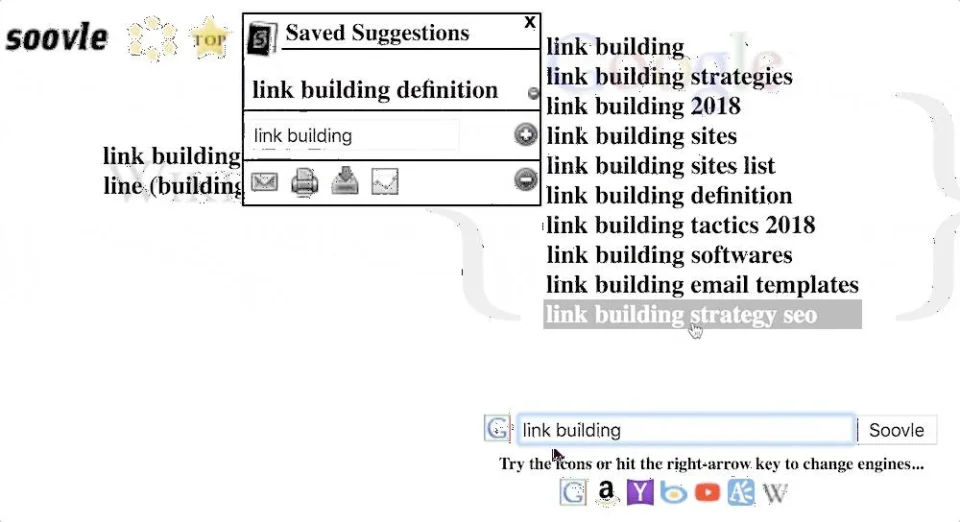This is a list of the 19 best keyword research tools in 2024.
These amazing tools have helped my organic traffic grow by 28.55% over the last year:
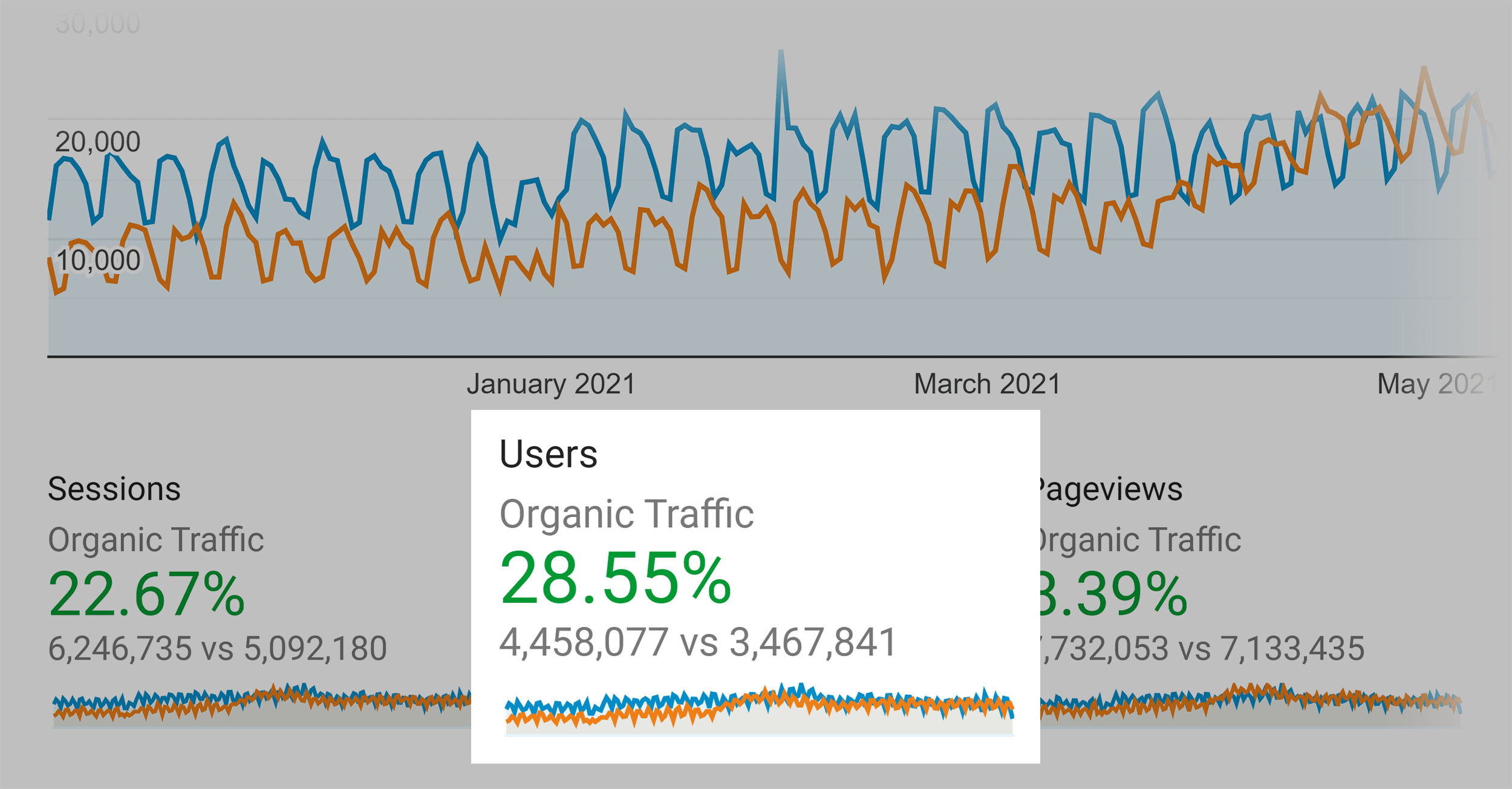
And in this guide, I’ll reveal the world’s best keyword research tools…
…and help you choose the best one for you.
The best SEO keyword research tools for SEO have one thing in common: helping users boost organic traffic and search engine visibility.
However, each tool approaches this goal differently. Some are all-in-one SEO platforms that specialize in technical SEO, backlink opportunities, and guest post outreach.
Others focus on niche SEO opportunities, such as finding underserved and easy-to-rank keywords or topic cluster research.
We’ve updated this post to account for SEO opportunities in 2024 and guide your choice of the best keyword research tools suitable to your needs.
Editor’s Note: Our recommendation for the top all-in-one SEO tool is Semrush. Keep scrolling for a detailed overview.
1. Semrush
Semrush works a little differently than the other tools I will show you.
Instead of entering a seed keyword and getting a long list of keyword ideas, Semrush shows you keywords that your competition already ranks for.
(These are usually outside-the-box keywords that would be impossible to find using any other tool.)
Here’s how it works:
First, enter a competitor’s domain name in the field at the top of the page.

If you’re doing SEO in a country outside of the US (for example, in Google.co.uk), you can choose to see information about that specific market. Just choose that country from this menu:
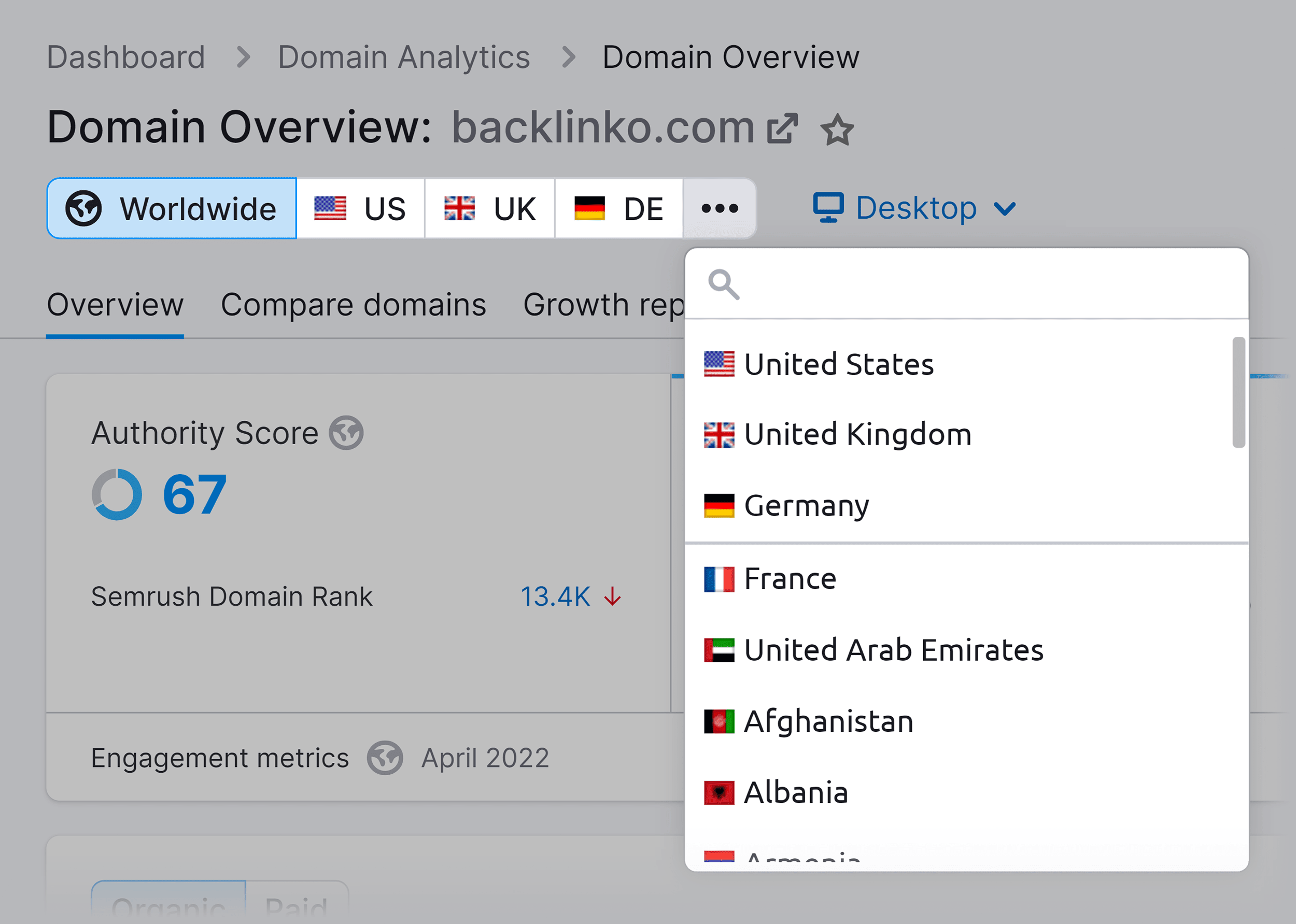
Next, take a look at the “Organic Research” section:
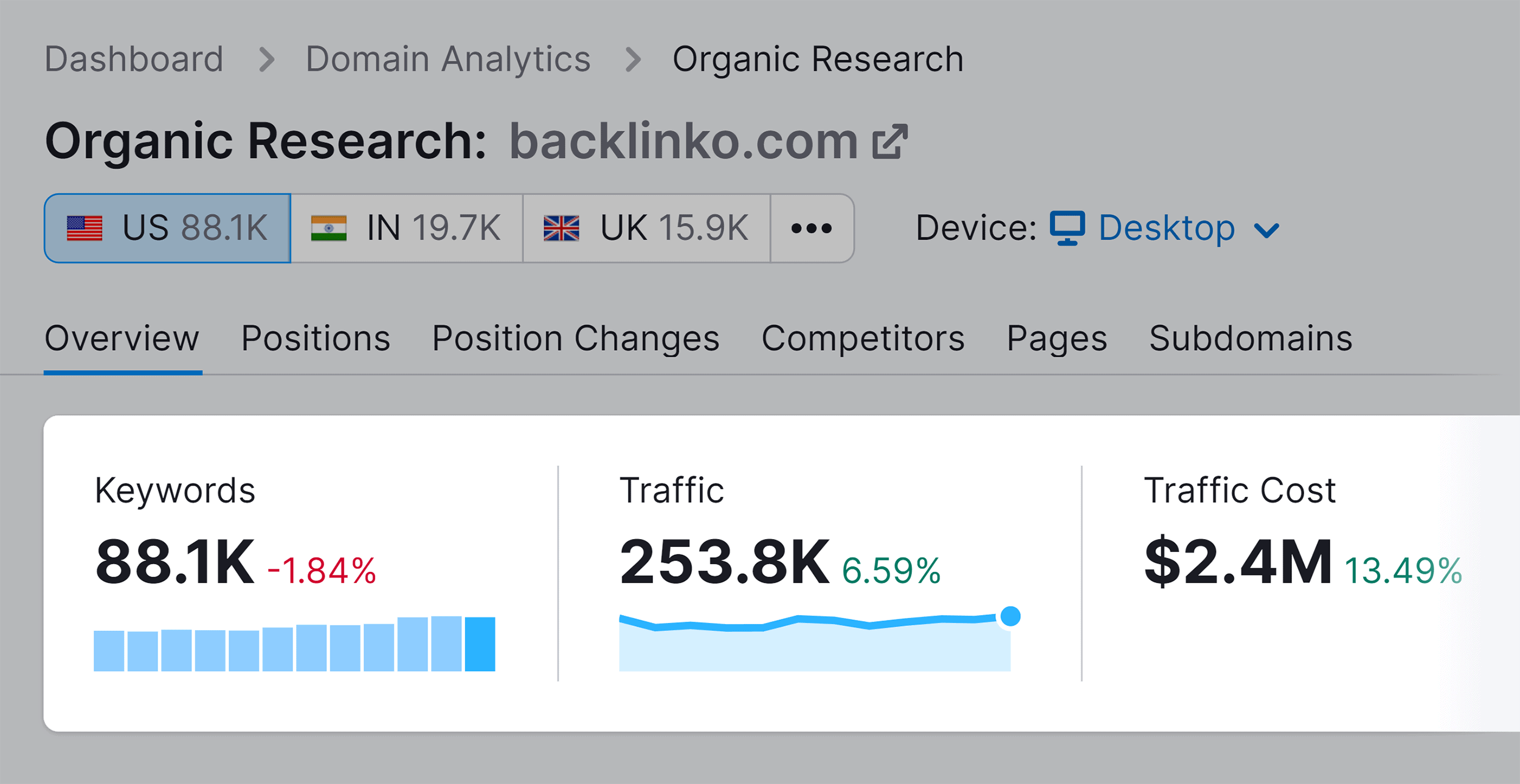
Here’s what the different terms in that section mean:
- Keywords are the estimated number of monthly organic visitors that come from Google.
- Traffic is the estimated number of monthly visitors.
- Traffic Cost indicates how valuable this traffic is (based on Google Ads CPC).
So if you see a domain with a lot of Organic Search Traffic but a low Traffic Cost, you know that they’re ranking for keywords that don’t convert into buyers.
But the real value of Semrush comes from the “Organic Keywords” data:
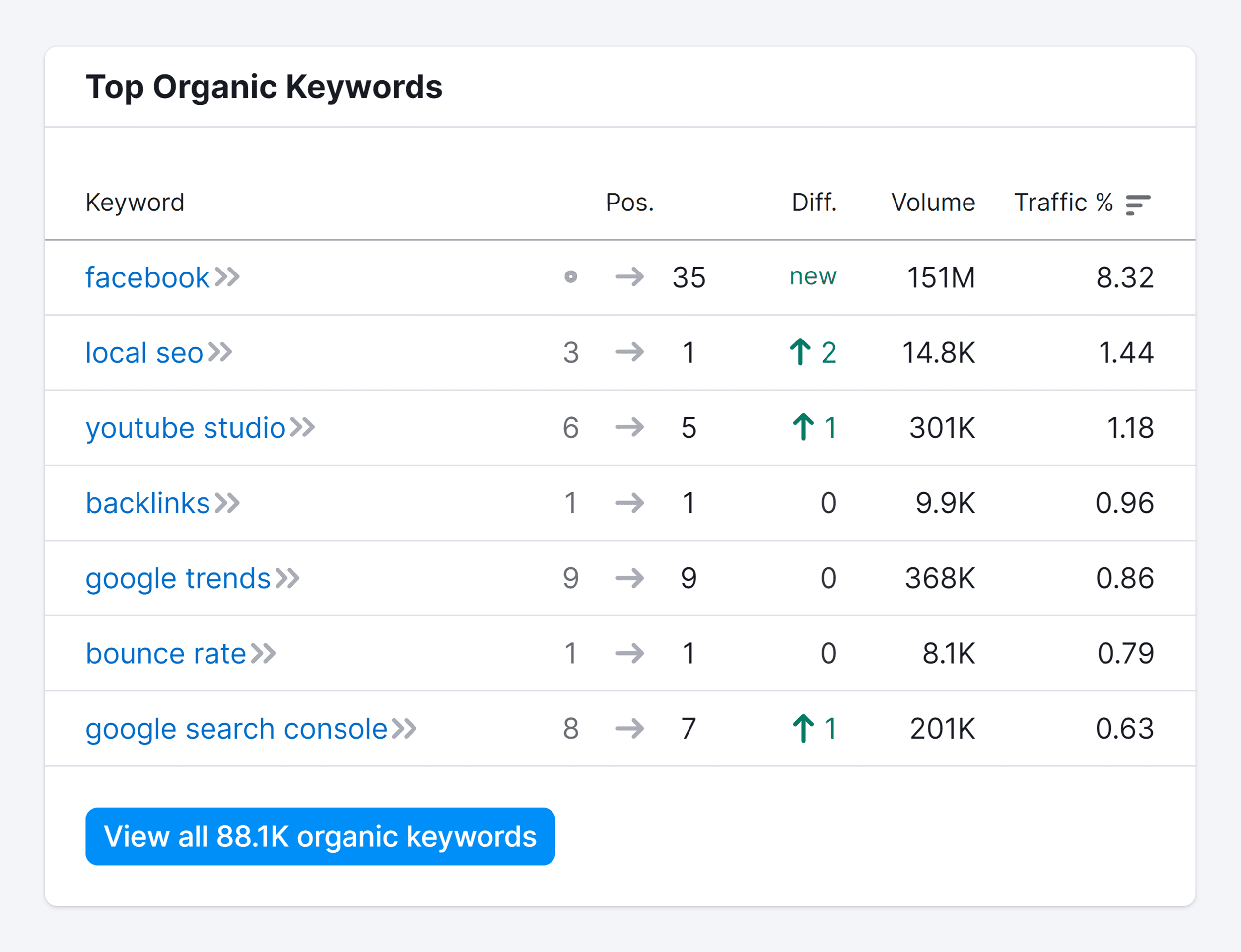
This box will show you 5 of the top keywords that your competitors are ranking for. To see more, click on “View all [number] organic keywords”.
And you’ll get a list of all of the keywords that the site or URL ranks for:
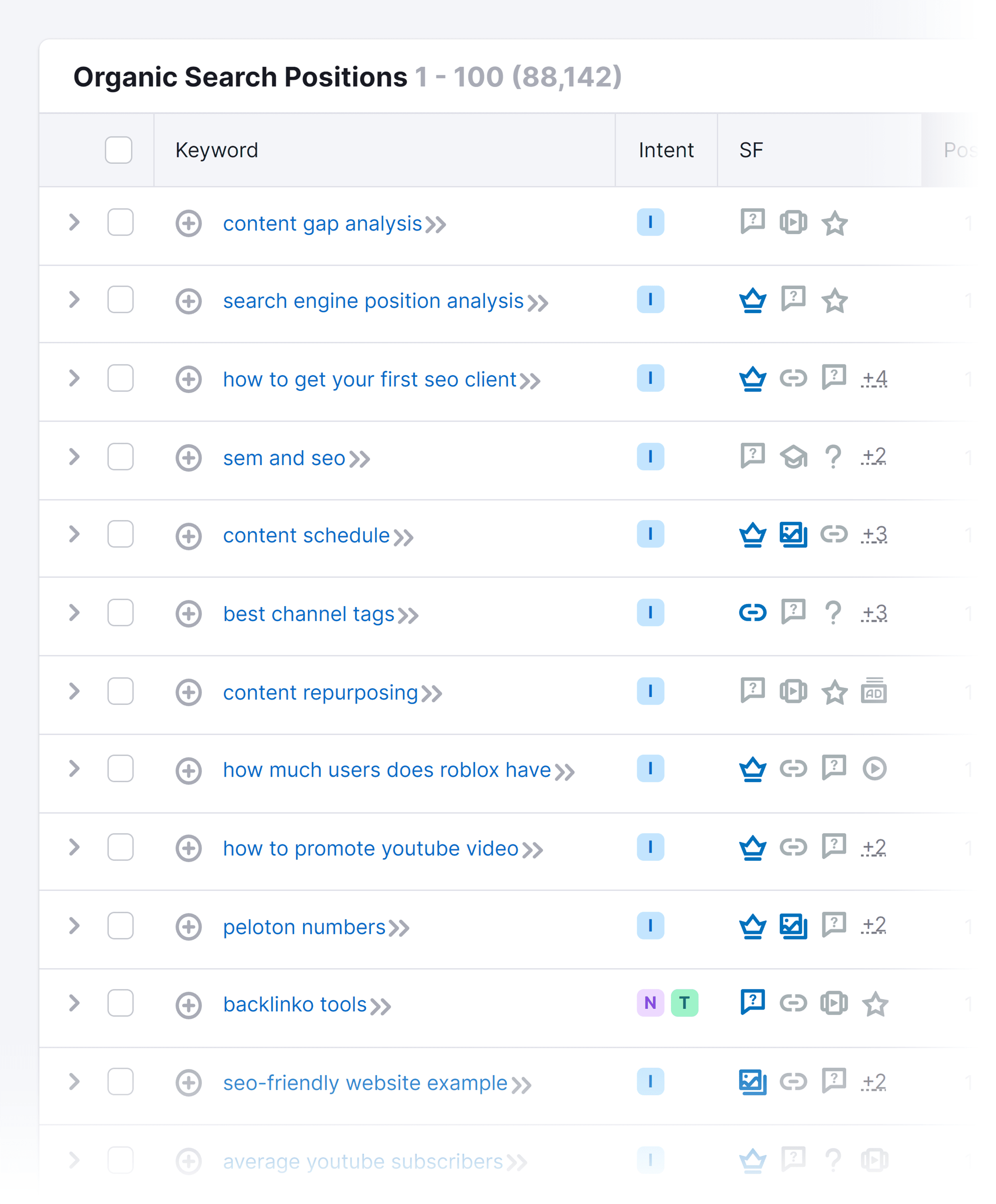
This page alone will usually give you a handful of solid keywords for digital marketing.
But if you want more ideas, go back to the “Organic Research” overview and check out the “Competitors” in the menu bar.
And you’ll see that site’s first-page competition:
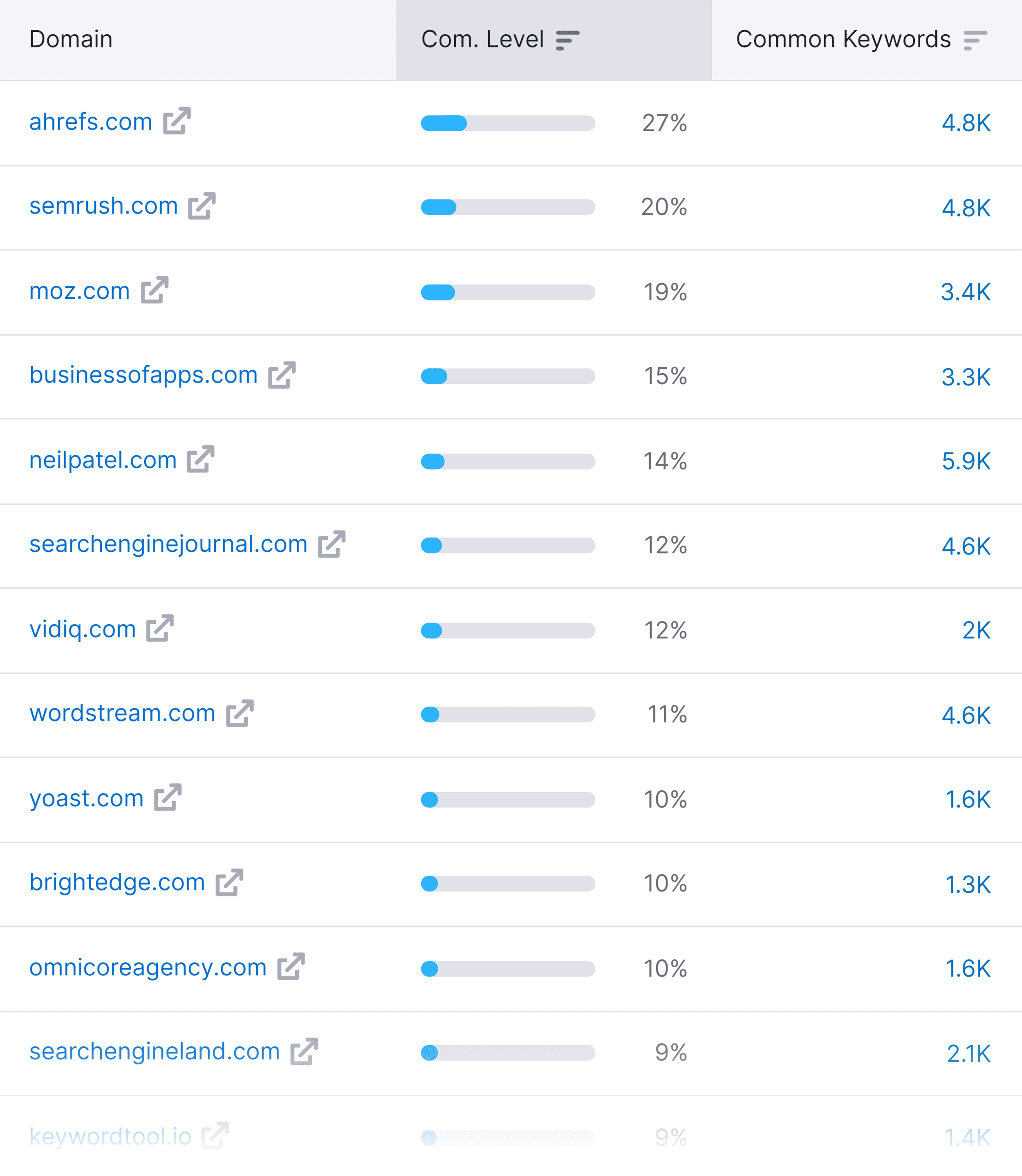
When you click on one of THOSE results, you can see the exact search queries they’re ranking for.
There will be some overlap from what you just saw, but you’ll also (usually) dig up some real gems.
You can also start your Semrush search with a keyword instead of a competitor’s site:

Semrush will show you a “Phrase match report”, which is a list of long-tail keywords that include the keyword you entered:
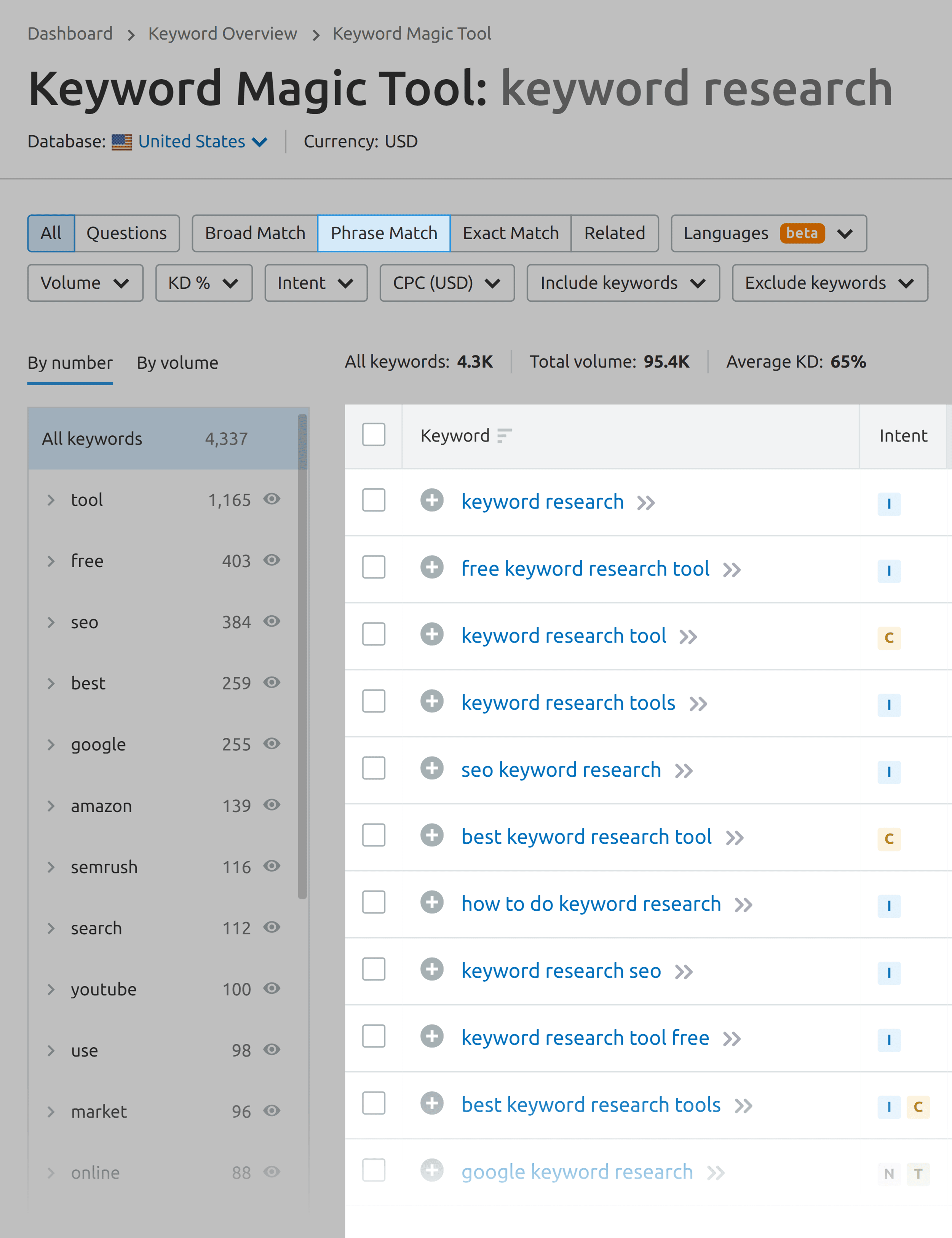
This is really helpful for finding long-tail variations of Head and Body Keywords.
For example, if you wanted to rank for the keyword “weight loss”, you’ll quickly find that it’s simply too competitive.
But Semrush will show you long-tail variations, like the “weight loss calculator”, that is MUCH easier to rank for:
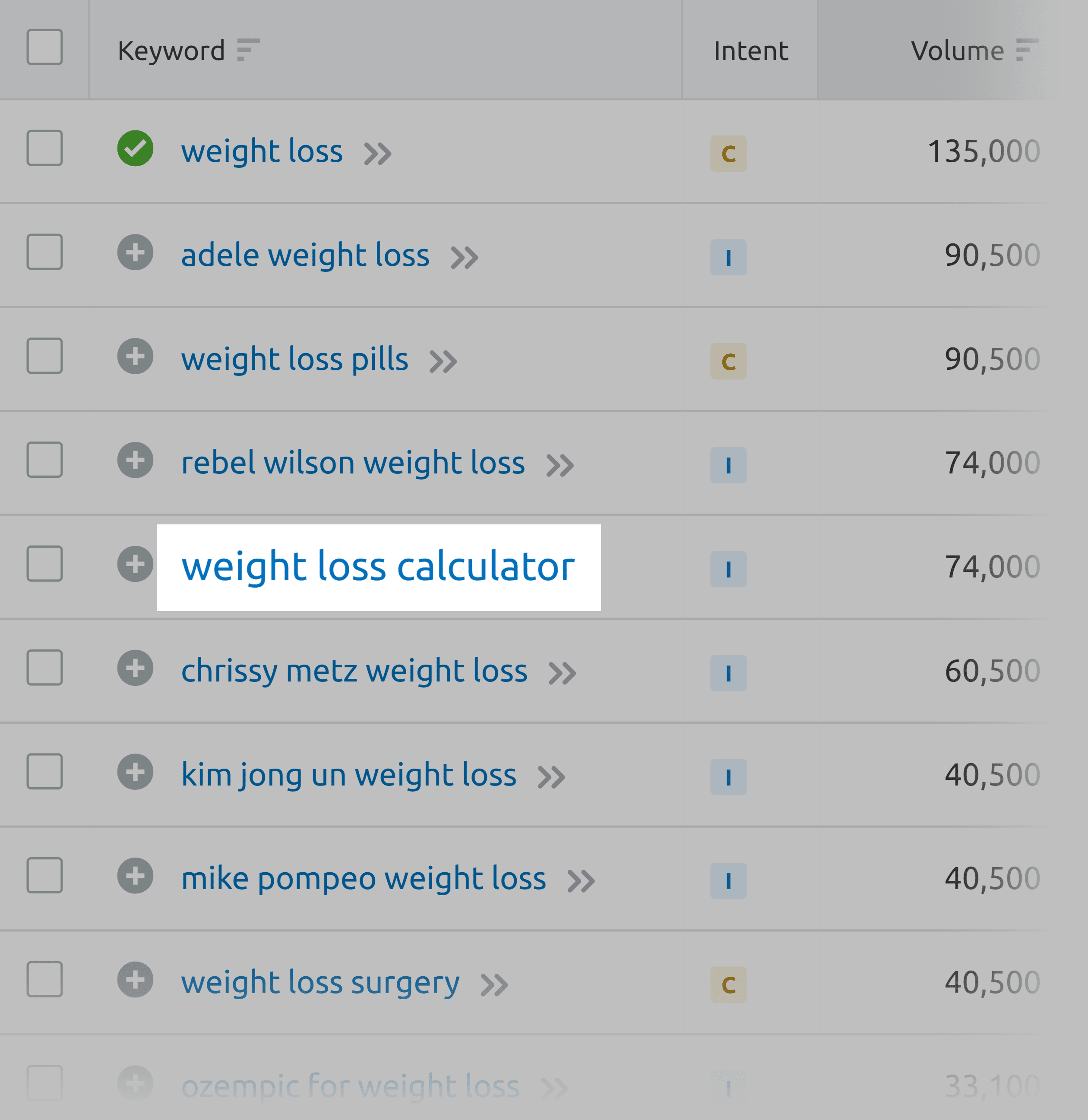
My Favorite Feature: Keyword Magic
This tool pulls keyword suggestions from Semrush’s massive database of over 25 billion terms.
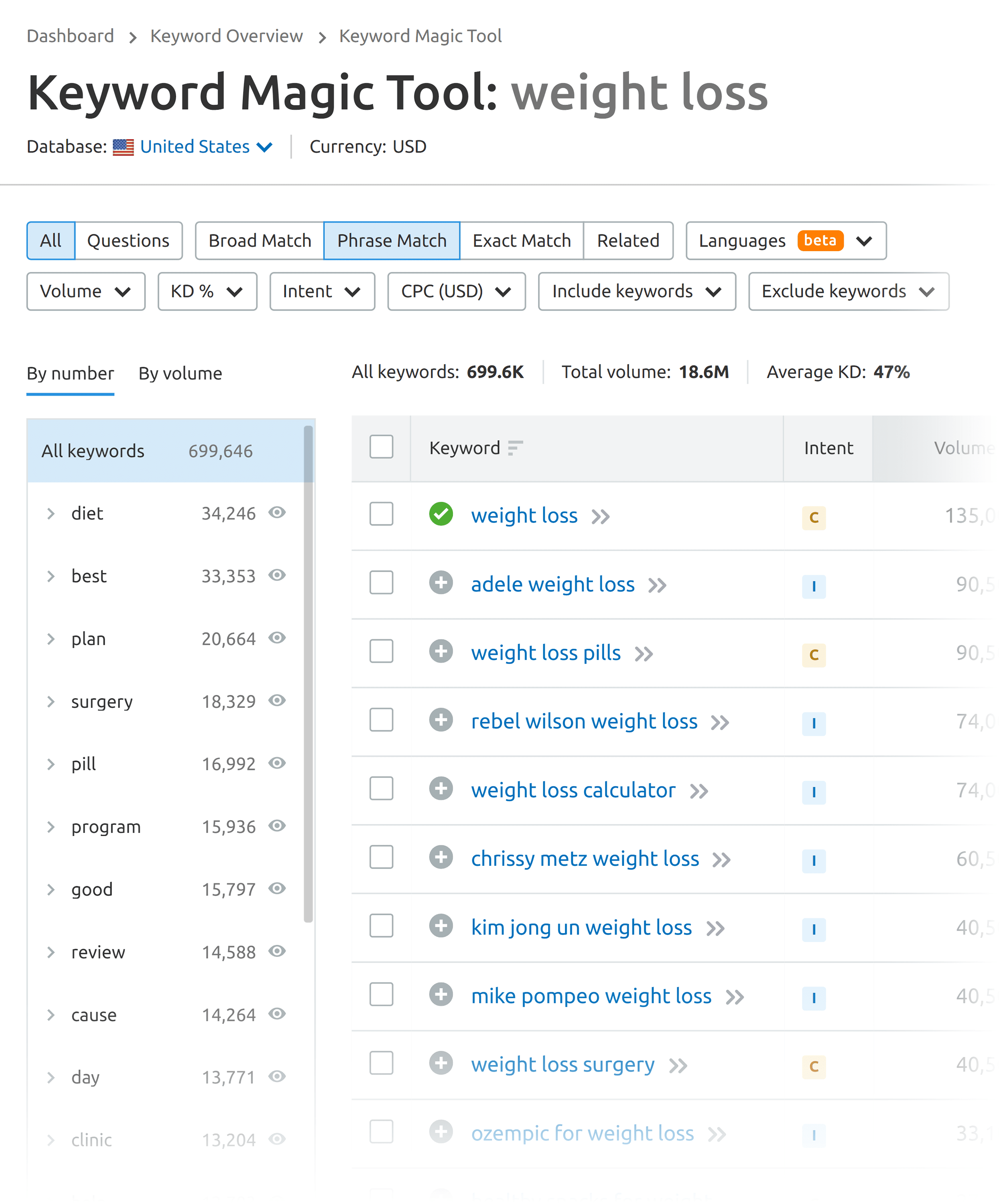

Brian's Bottom Line
Semrush is my favorite keyword research tool. Not cheap. But if you’re serious about SEO, it’s a must-have.
For those just starting with SEO, it can be daunting to invest in expensive keyword research tools.
That’s why we’ve created this free keyword research tool, leveraging the extensive database of keywords from Semrush.
This tool assists in pinpointing low-competition keywords, sparking ideas for blog content, and providing insights into monthly search volumes.


Brian's Bottom Line
This is our first free tool on Backlinko and I already love using it for quick keyword research.
3. Soovle
Scrape suggested keywords from multiple sources.
Soovle gives you suggested keyword ideas from Google, YouTube, Bing, Yahoo, Amazon and more.
(All in one place.)
That way, you can find untapped keywords that your competition doesn’t know about.

My Favorite Feature: Saved Suggestions
Easily save your favorite keyword ideas with Soovle’s “drag & drop” saved suggestions feature.
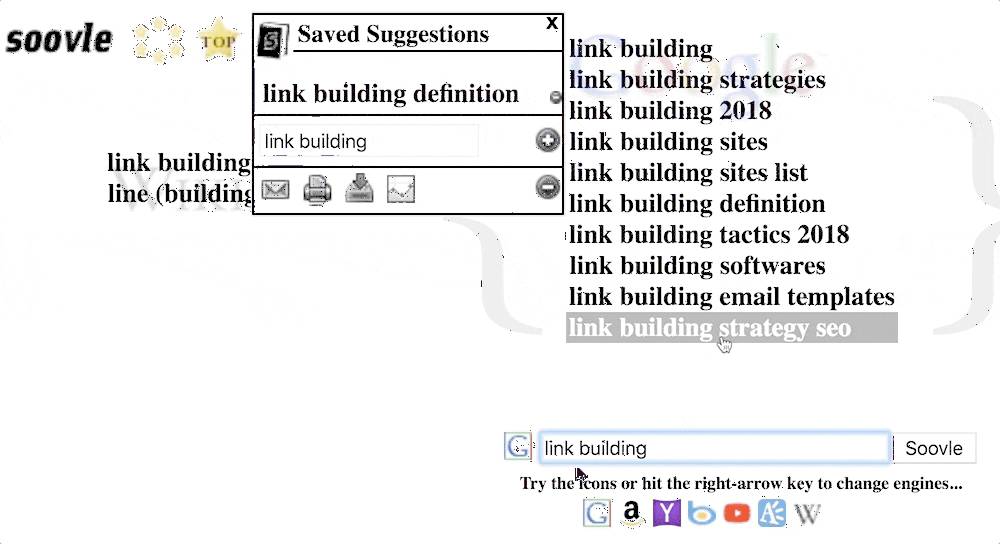
Then, download your favorite keywords to a CSV file.

Brian's Bottom Line
Soovle is one of the best free keyword research tools out there.
4. TopicRanker
Discover keywords based on problems and weaknesses on the search engine results page.
TopicRanker is a fantastic tool for those who want to hit the ground running.
It’s meant for the SEO layperson — folks who don’t require advanced SEO features but are on the hunt for keywords that they have an immediate chance of ranking for.
The best part? TopicRanker does all the heavy lifting — all you have to do is input your website URL.

Once the app analyzes the topical depth of your site, it will suggest seed topics relevant to your niche.
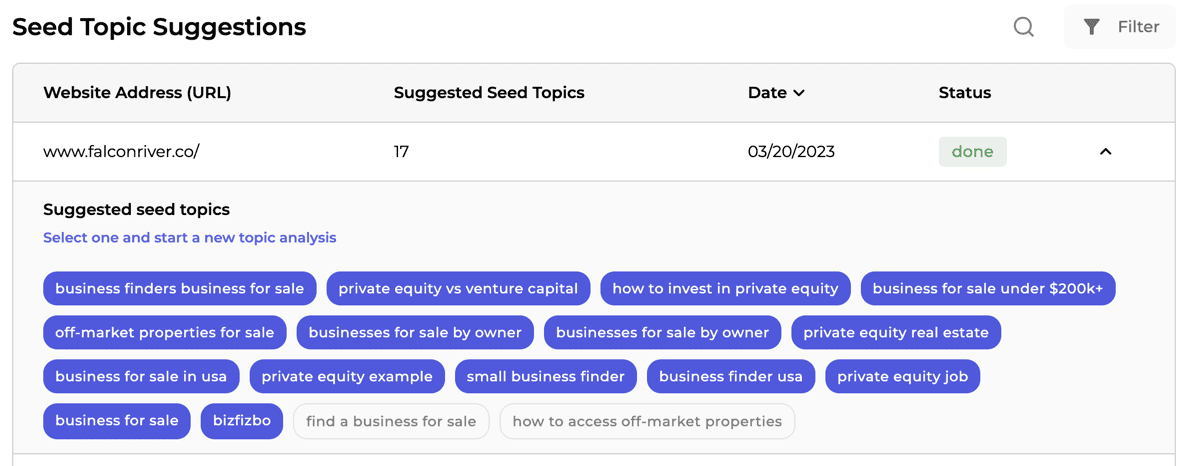
Note that these are seed topics — groups of keywords that can be further broken down into related keywords.
Clicking into any of these seed topics is where TopicRanker really starts to shine through by showing you specific keyword queries with multiple problems on the search results page:
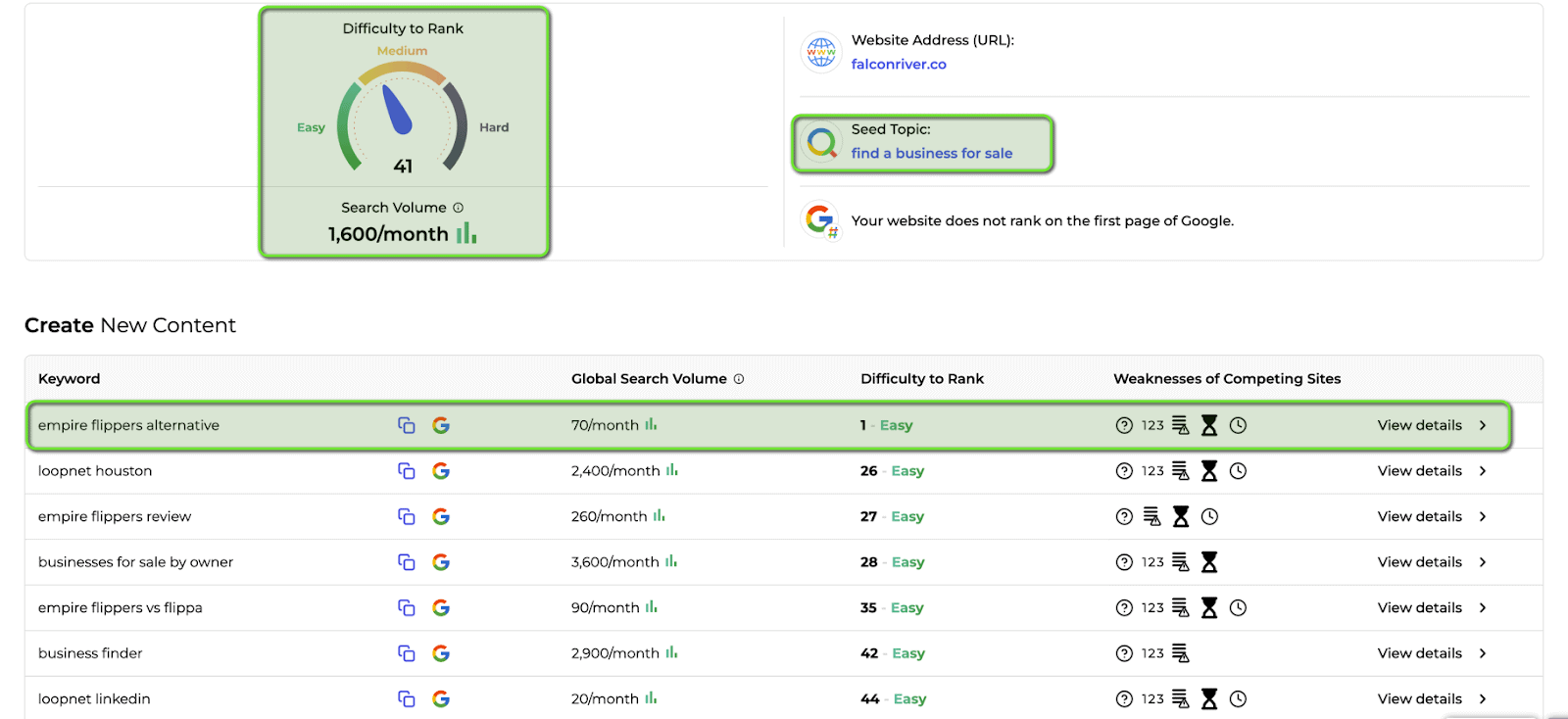
The tool combs through millions of search results to find only the search queries with an actual problem with the search results.
It then filters these easy-to-rank keywords ensuring relevancy to your niche by giving you search volume and specific problems it identifies on the search results with actionable ranking strategies.
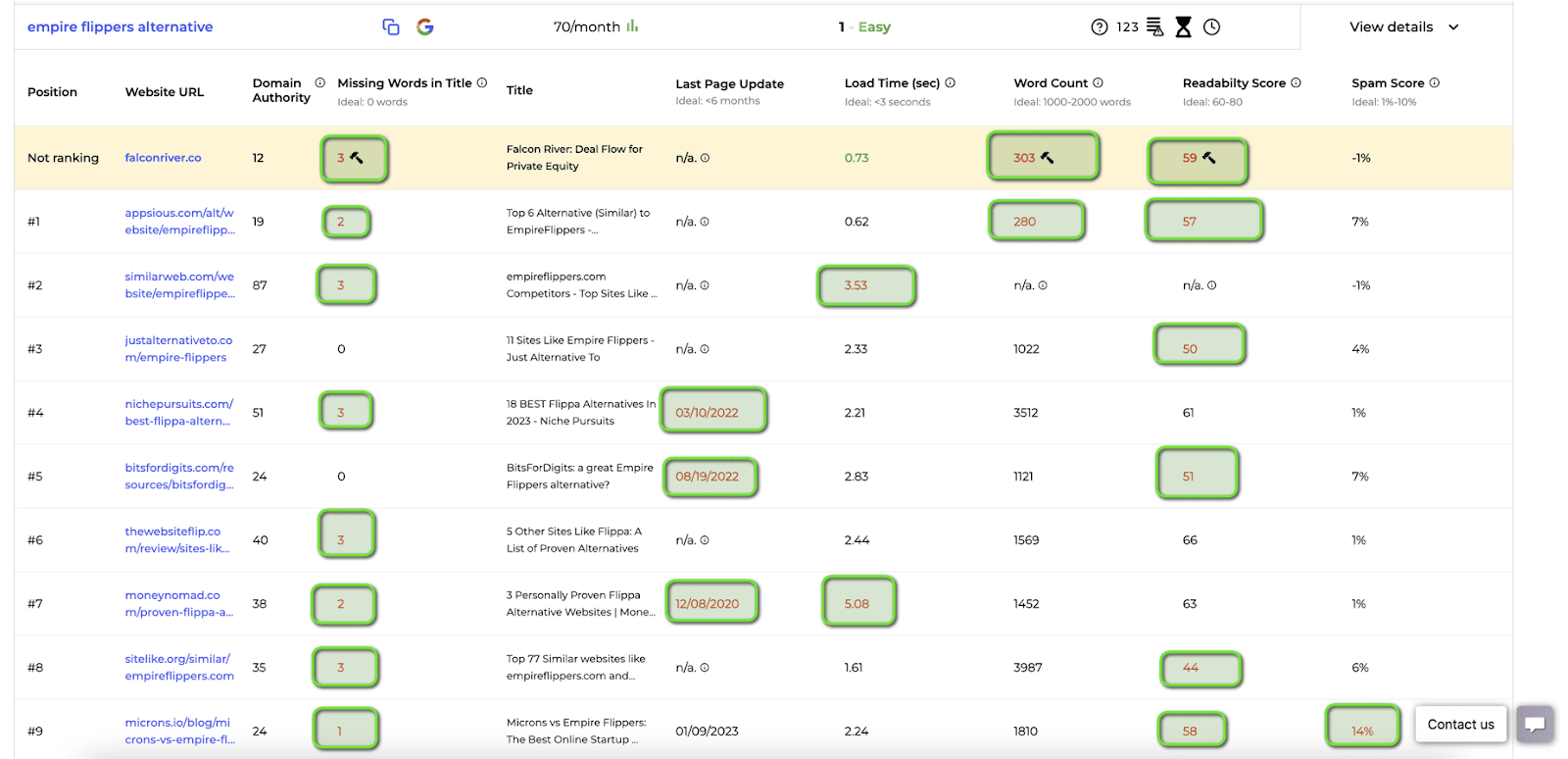
Expanding ‘view details’ highlights specific problems spotted on the SERP:
- Title mismatch – the title of the page ranking does not contain search query terms
- Thin content – word count of pages ranking is very low,
- Old content – the search results page contains a lot of outdated articles
- Poor readability of the pages ranking high on search results
- Poor load speed of the pages ranking high
- Forums sites such as Quora, Facebook, and LinkedIn appear high on search results
- High spam score for sites appearing high in search results
Take these tips, produce better content, and you’ll start to see results quickly.

Brian's Bottom Line
TopicRanker takes a unique approach to how it weighs its prioritization metrics, allowing it to surface opportunities other tools won’t find. This tool combines epitomizes efficiency and relevance in keyword research by finding problems and weaknesses in the SERP. TopicRanker will soon be launching its AI Writing Tools to generate content with AI and NLP; making it a must-have for anyone doing SEO. Plus, at just $47 it’s a great value.
5. Jaaxy
Get thousands of related keyword ideas within seconds.
This is a straightforward (yet powerful) tool.
So, what makes Jaaxy unique?
First off, it gives you LOTS of different keyword ideas.
(Including some that you won’t find in most other tools.)
Plus, you get helpful data on every keyword that it generates (including competition, search volume, and potential traffic).
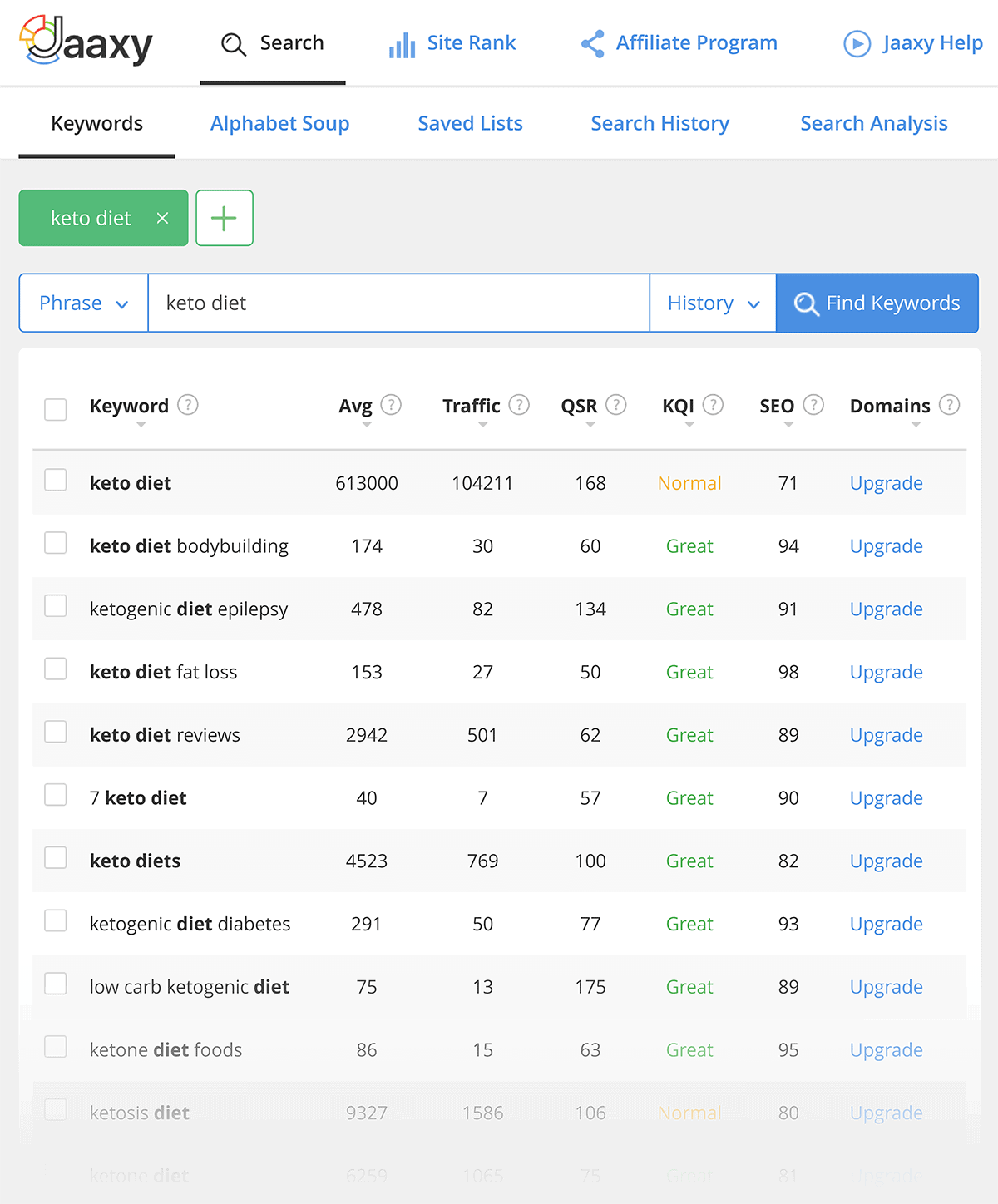
My Favorite Feature: QSR
QSR stands for “Quoted Search Result”.
This is a fancy way of saying: “how many other websites are trying to rank for this exact term?”.
Obviously, the lower this number, the better chance you have of ranking #1.
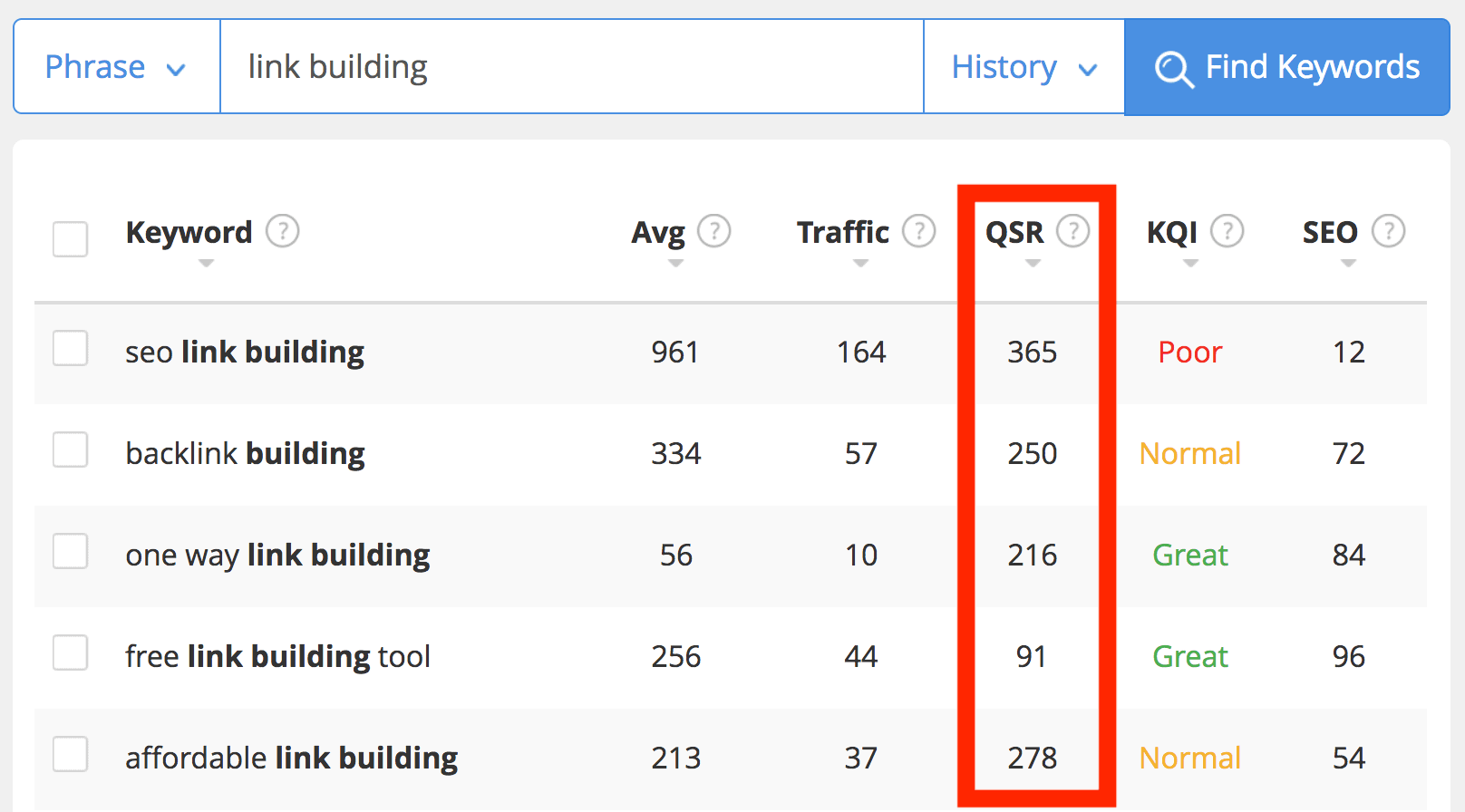

Brian's Bottom Line
Jaaxy is a decent freemium tool. Not nearly as good as something like Semrush. But at $50/month, it’s not a bad deal.
Find hundreds of “Opportunity Keywords”.
The Google Search Console isn’t a traditional keyword research tool.
But it does have a feature that makes finding awesome keywords a CINCH.
The feature?
This report list out the pages on your site that get the most clicks from Google.
(And the exact keywords that brought them there)
So: how can you use this feature for keyword research?
It’s easy: use it to find “Opportunity Keywords”.
Opportunity Keywords are where you rank between #8-#20 in Google for a specific keyword.
And with little extra on-page SEO, you can find yourself with a nice rankings boost.
For example, my average rankings for the keyword “SEO tool” is 6.2.
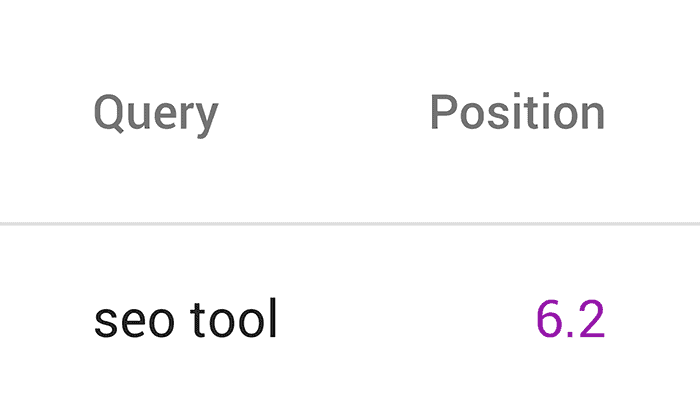
That keyword is an Opportunity Keyword. And if I optimize my page around “SEO tool”, my rankings for that term should go up.
My Favorite Feature: Google Analytics + Google Search Console
Did you know that you can combine your Google Search Console and Google Analytics accounts?
Well, you can.
And it’s VERY helpful.
When you do, you’ll get more in-depth keyword data than you would with either tool by itself.

Brian's Bottom Line
The Google Search Console is an underrated keyword research tool. No other tool can help you find Opportunity Keywords like the GSC.
Make smarter keyword decisions.
Ahrefs recently rolled out a new and improved “Keywords Explorer”.
And what I like most about Keywords Explorer is this:
It gives you SUPER in-depth information on each keyword.
Sure, you get the data you’d expect (like search volume). But you also get a breakdown of the first page competition… and how many searchers actually click on a result.
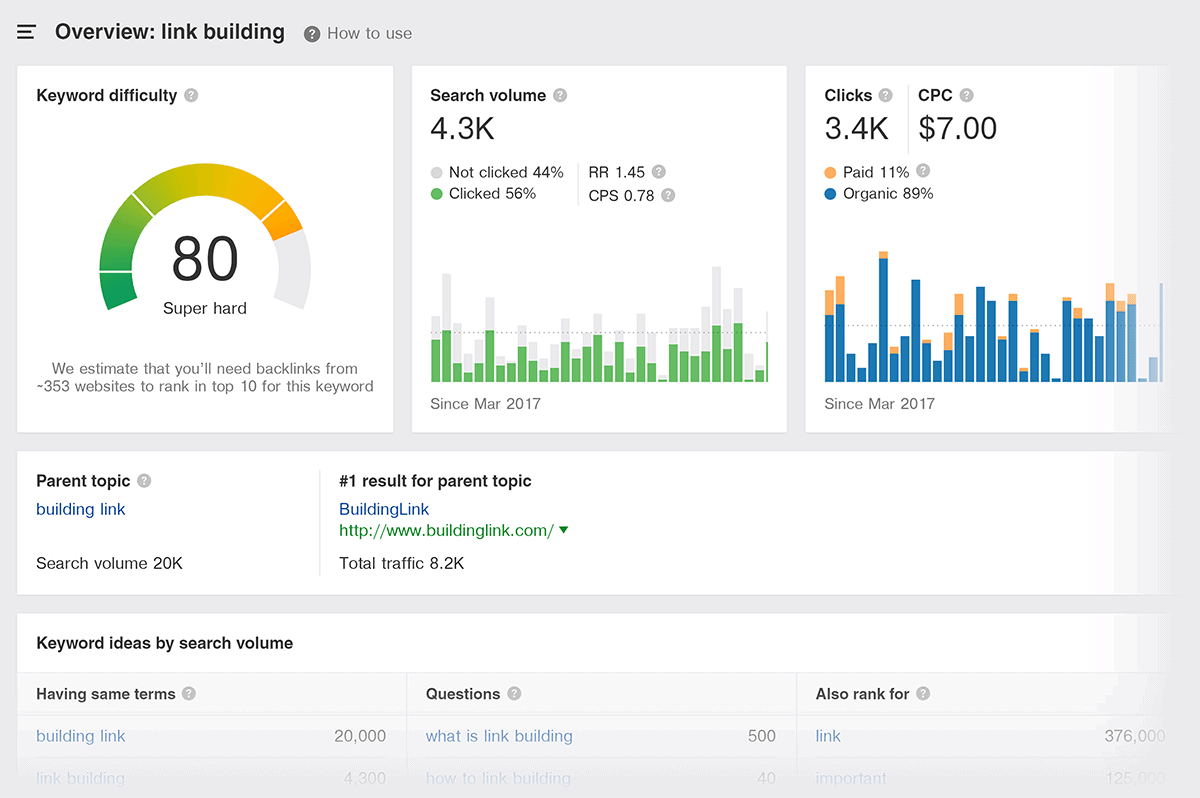
My Favorite Feature: Keyword Difficulty
Most keyword research tools give you vague difficulty info (like “easy” or “difficult”). Or a score (like “89/100”).
But Ahrefs tells you EXACTLY how many backlinks you’ll need to rank on the first page of Google.
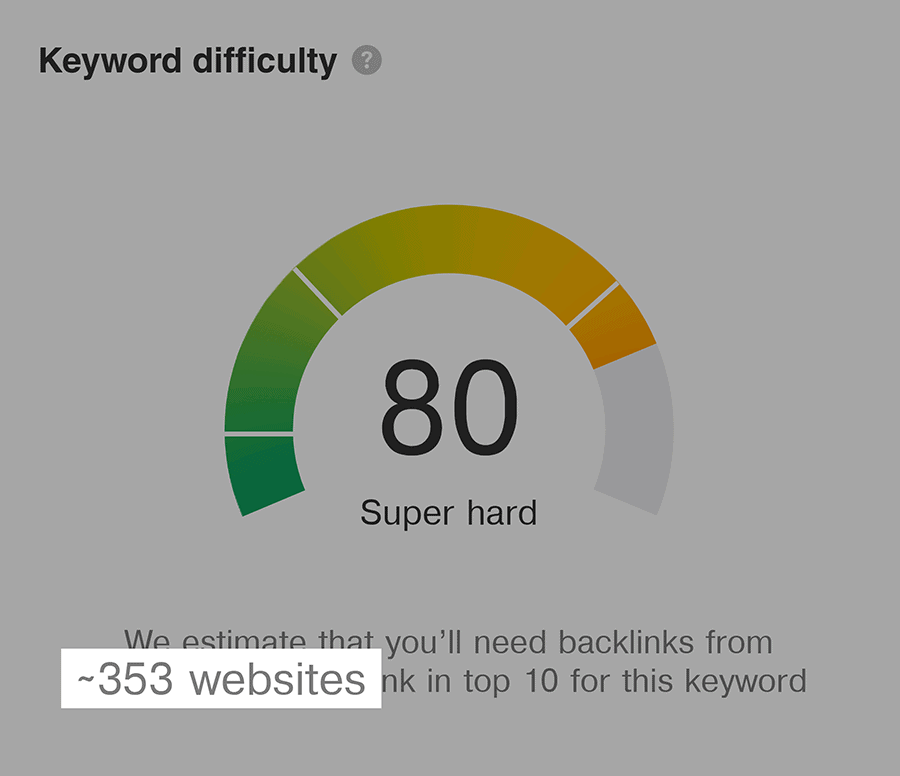
Awesome.

Brian's Bottom Line
Ahrefs is mostly known as for backlink analysis. But I have to say: it’s got a killer keyword research tool. I find myself using it more and more every week.
8. SECockpit
Keyword research for SEO pros.
This a Swiss Army Knife of keyword research tools.
Like any other keyword tool, you give SECockpit a seed keyword… and you get a list of results.
But what makes SECockpit unique is the built-in features that allow you to get A LOT of depth on search trends, organic competition and traffic estimates.
Which means that it’s a tool largely designed for SEO professionals.
Sure, newbies can get value out of this tool. But there’s no doubt that SECockpit is targeted for people that sleep, eat and breathe SEO.
If you’re brand new to SEO, the sheer number of features in this tool might be overwhelming for you. But if you’re looking for lots and lots of depth, you’ll probably get your money’s worth.
With that, here’s how it works.
When you login you’ll automatically go to your Dashboard, where you can create projects around sets of keywords…or jump right in with a single keyword search.
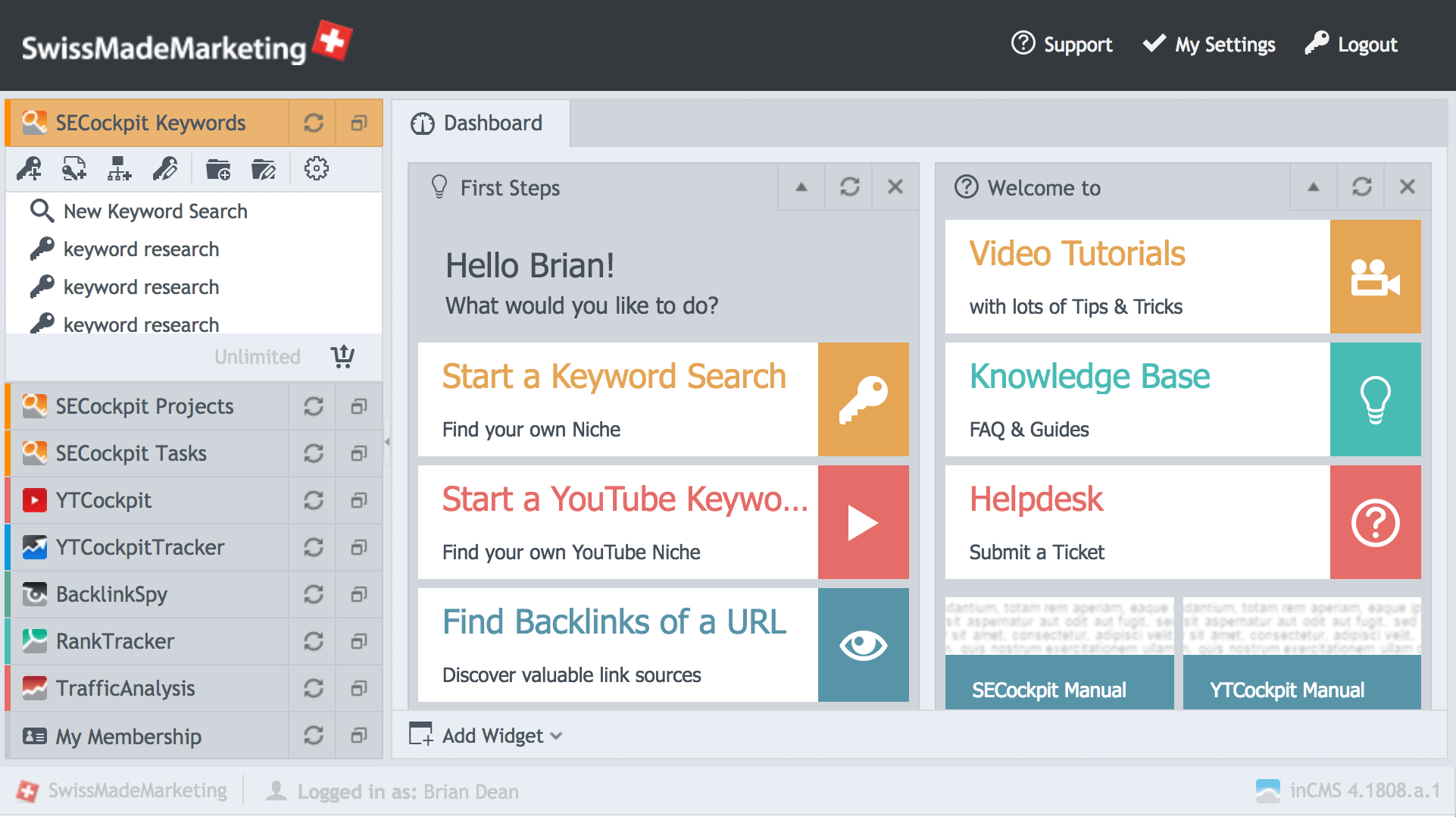
To start the keyword research process, click on “Start a Keyword Search”:
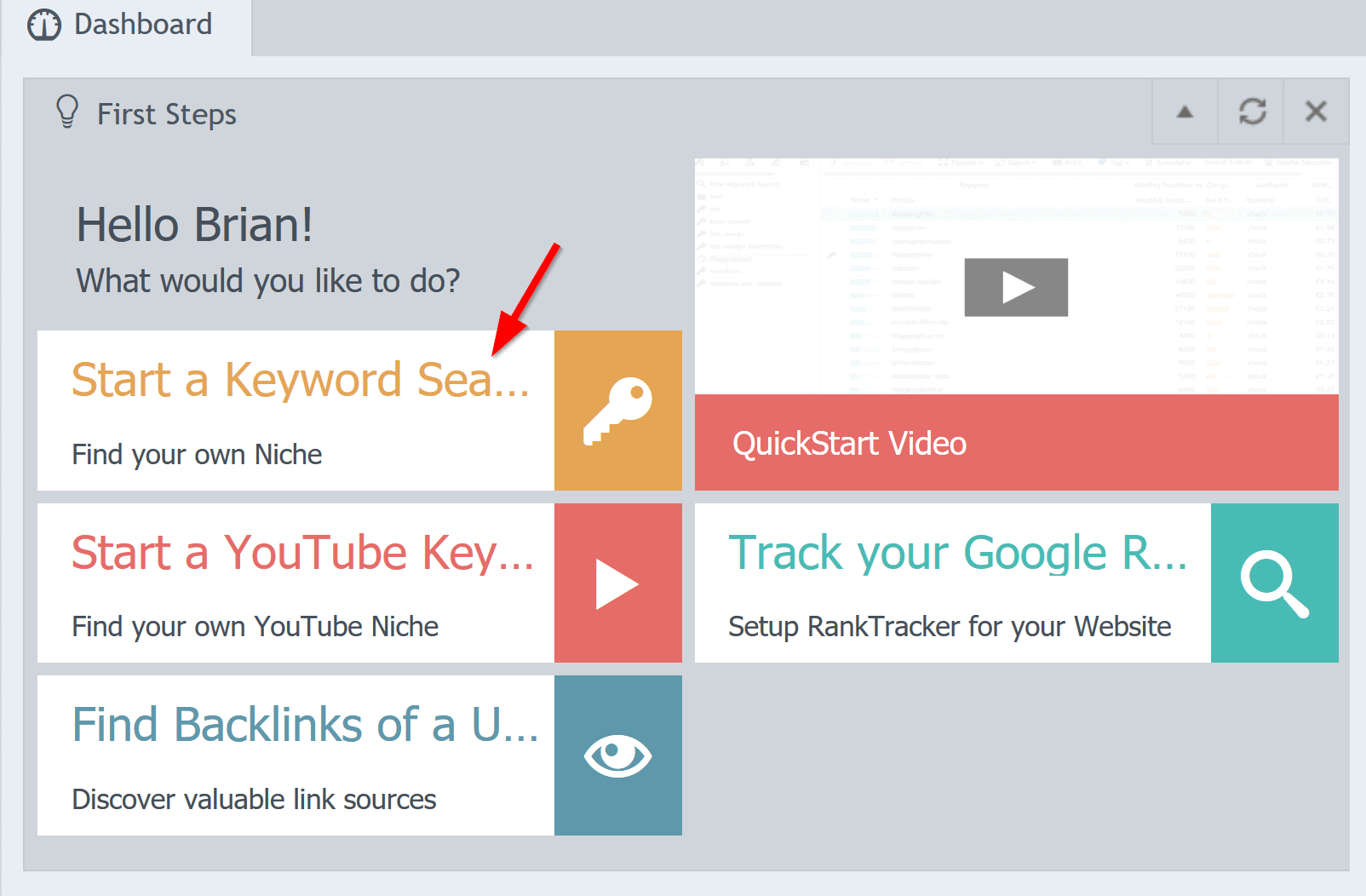
Then, enter a seed keyword in the field marked “Keyword Phrase”:
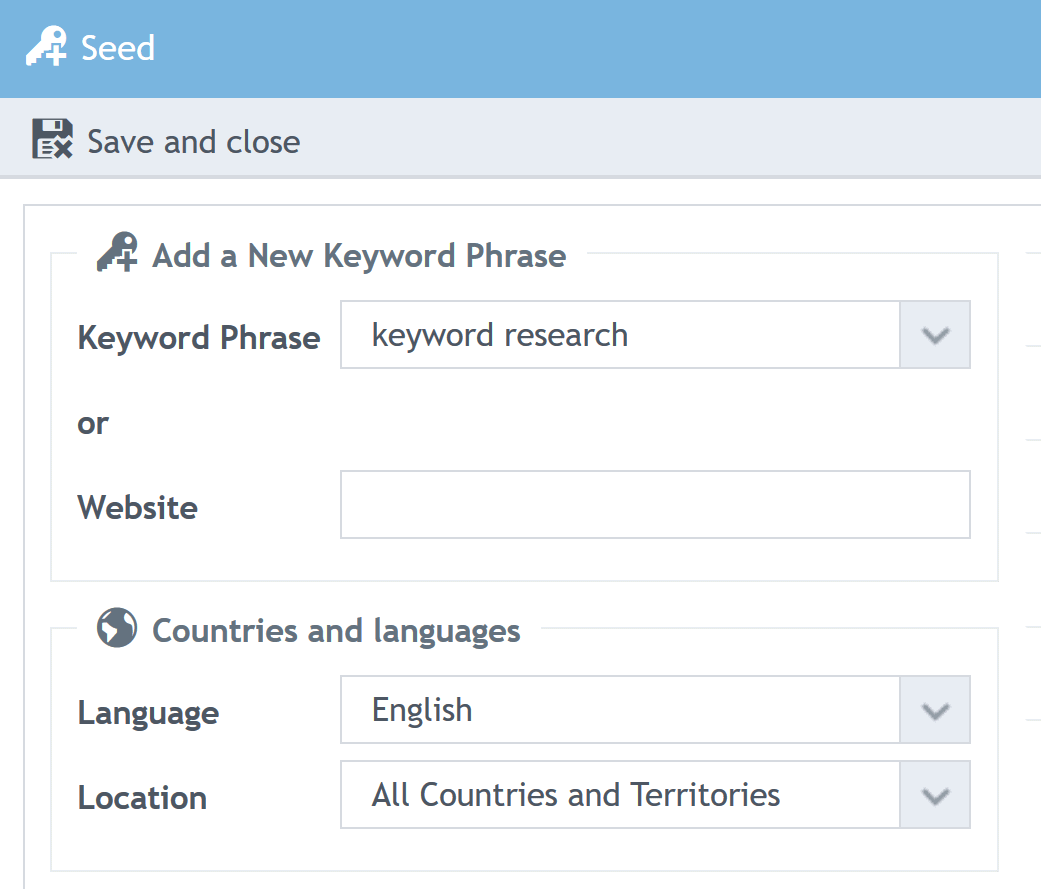
You can get even more results by choosing to include Google Suggest, Related Searches and synonyms pulled from Google Ads:
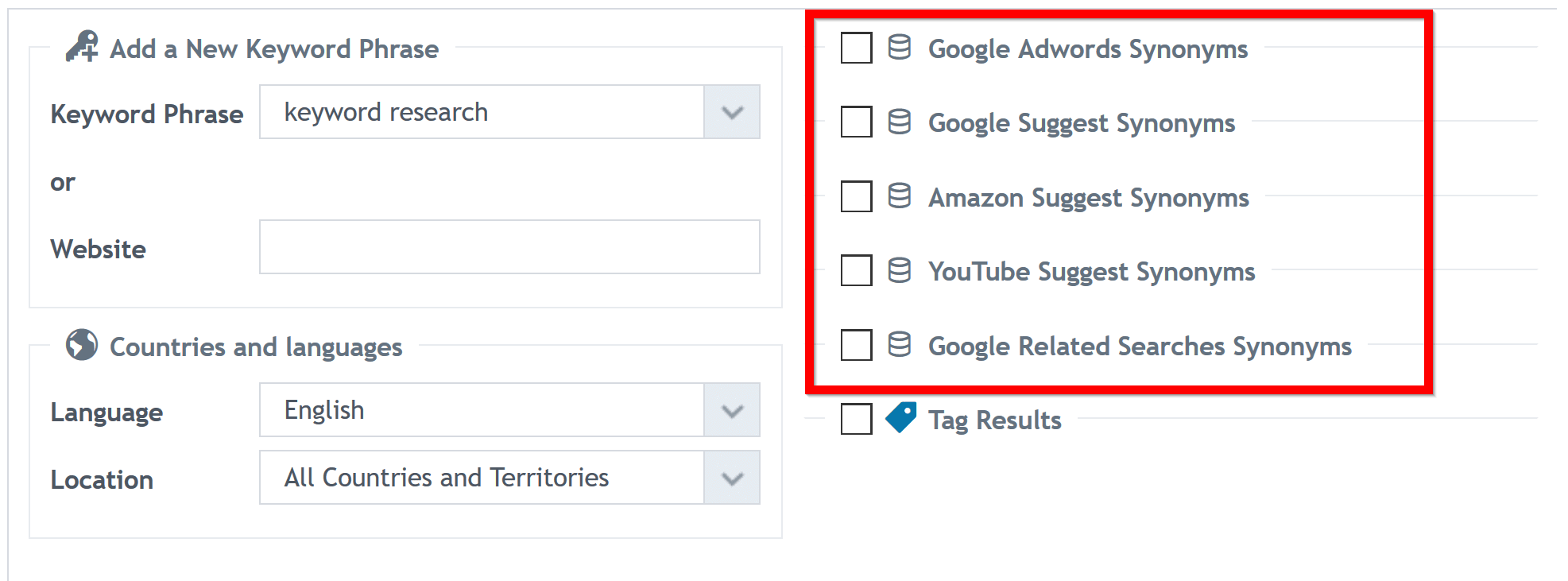
When you’re done, click on “save and close” and the tool will get to work:
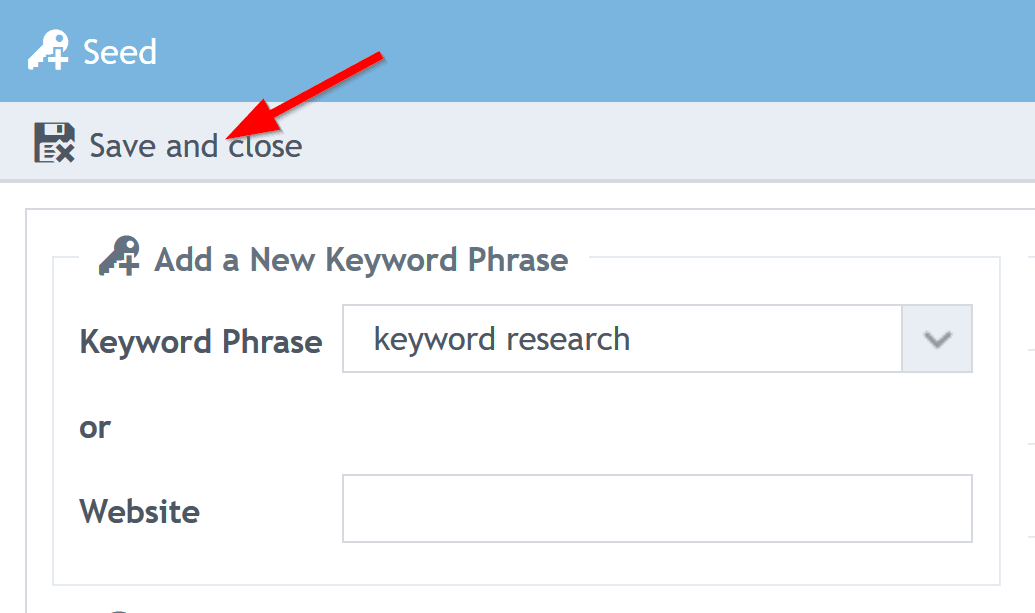
Here’s the report you’ll get:
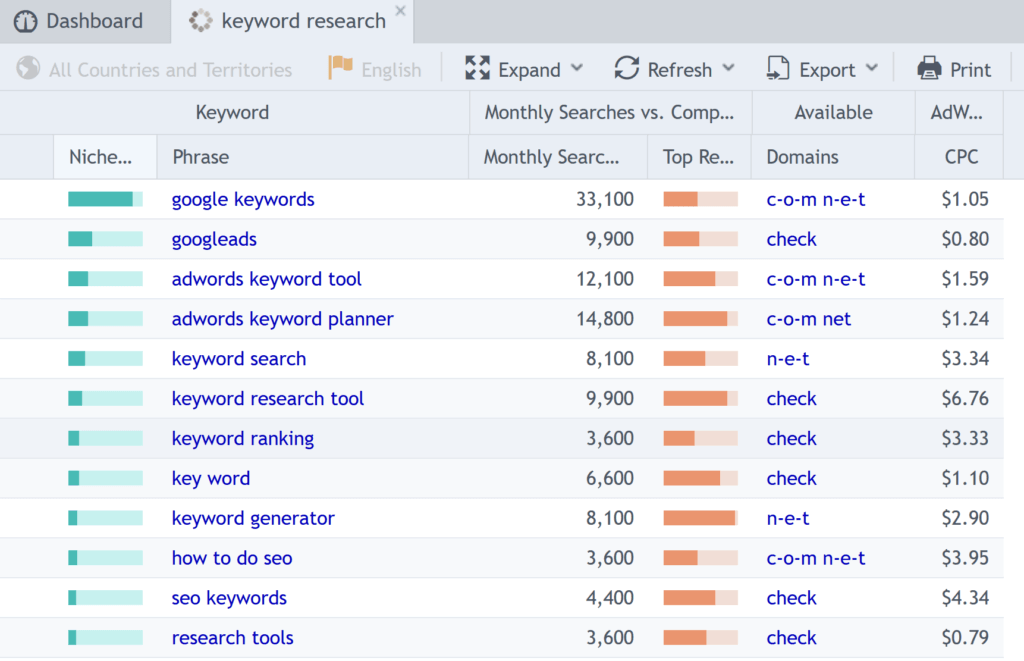
If you’ve ever used the Google Keyword Planner, the data here should look familiar to you.
In fact, the columns “Phrase”, “Monthly Searches” and “CPC” are pulled directly from the GKP:
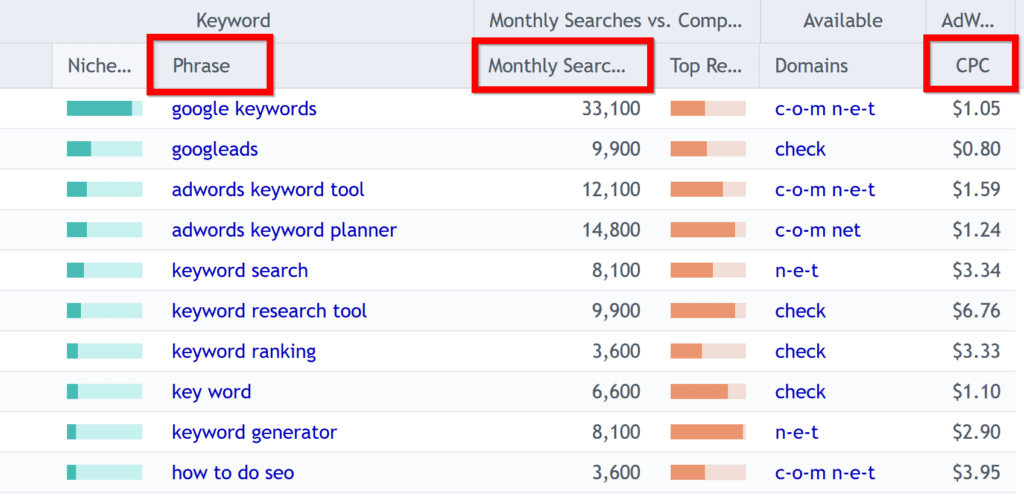
(The only difference is that CPC is called “Top of page bid” in the GKP)
So: what does the other information in SECockpit mean?
Well you’ll notice a bunch of green bars under the column labeled “Niche”:
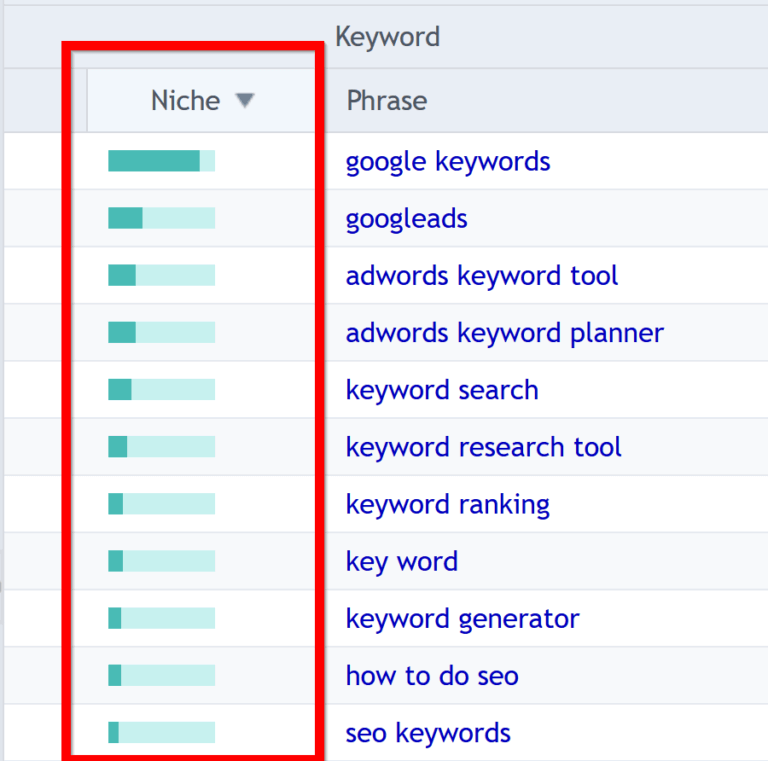
This bar is a single metric that takes into account first page competition, monthly search volume, and commercial intent. In other words, whether or not that search query is a good overall choice. The larger the bar, the better the keyword.
Next to monthly searches you’ll notice a series of orange bars labeled “Top Results”:
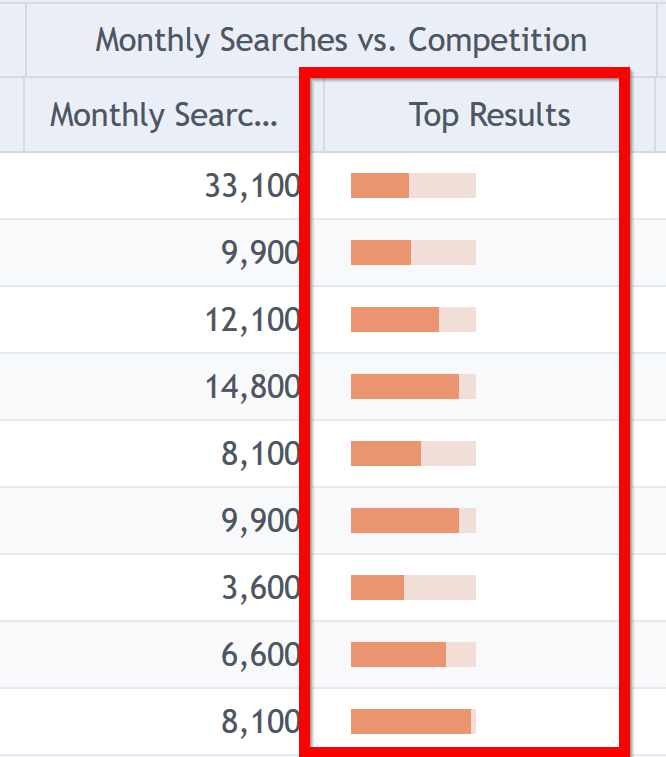
This bar indicates the difficulty of ranking for that particular keyword based on the current top 10 results.
And when you click on a keyword, you get a breakdown of that keyword’s search results.
When you do, SECockpit will display important competition metrics for the top 10 pages in the results… including Moz Domain Authority and total backlinks:
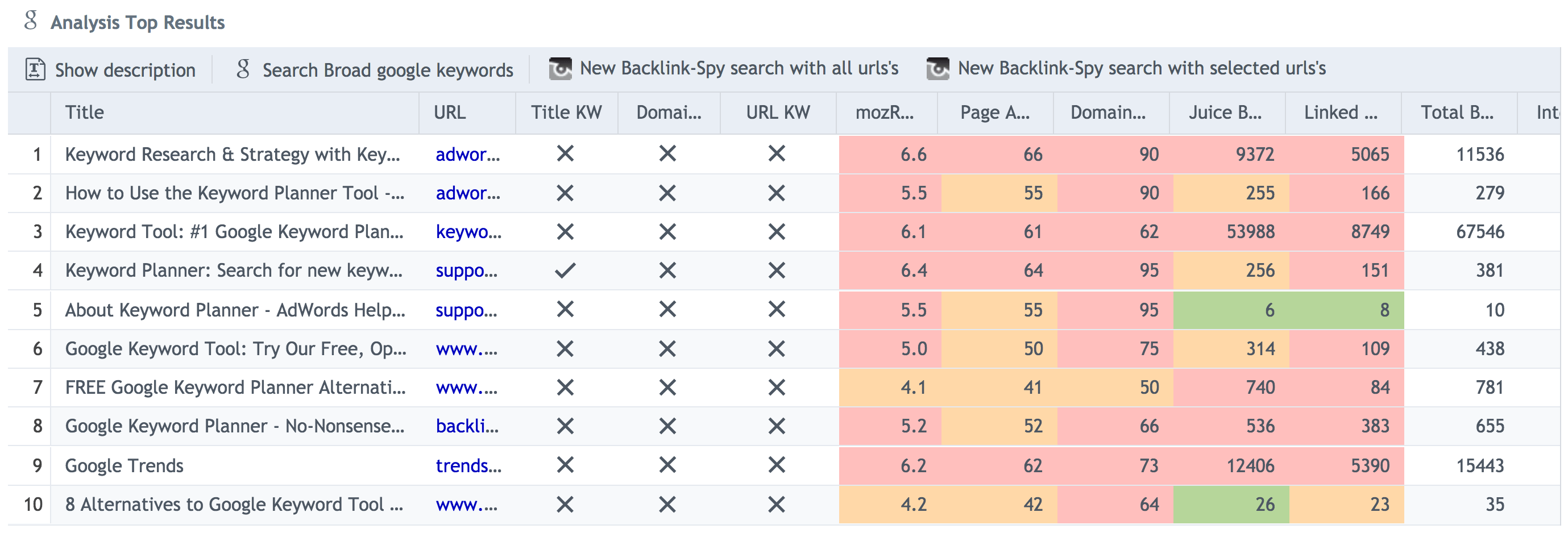
This is a great way to quickly size up competition without having to look one-by-one at the SERPs.
And you go back to the keywords page, you can actually add at least 20 more columns to the results:
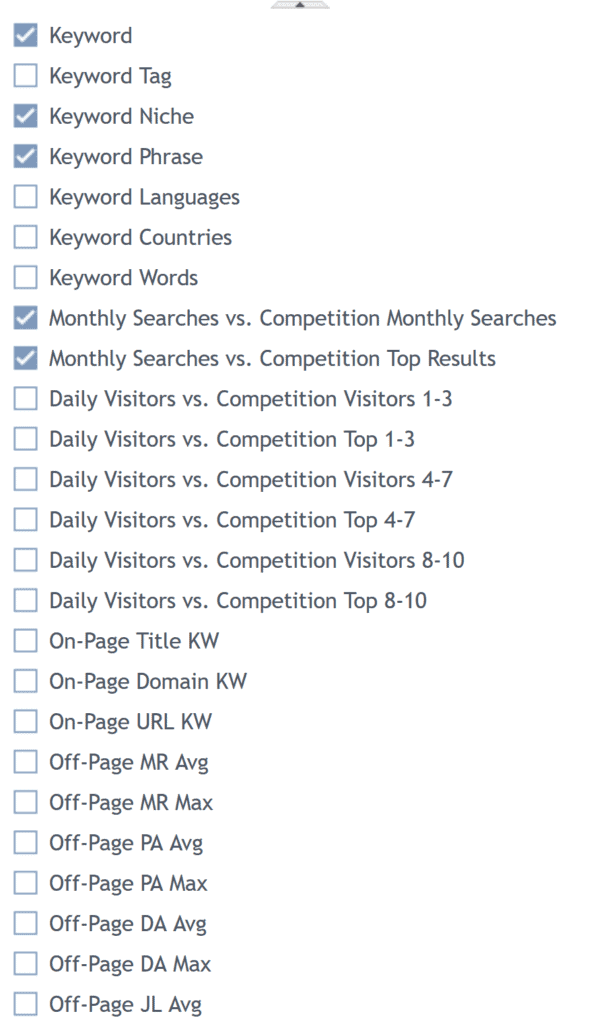
For example, you can see a ratio of the keyword’s competition in comparison to its search volume. Or you can get a comparison of the estimated traffic you’ll get from hitting the top 3 for that keyword. And lots more.
My Favorite Feature: Filtering
You can use over 100 filters to find the keywords that you want.
For example, do you only want keywords that get searched for at least 10k times per month? Done.
Or maybe you want terms that have the best ratio of search volume and competition. You got it.
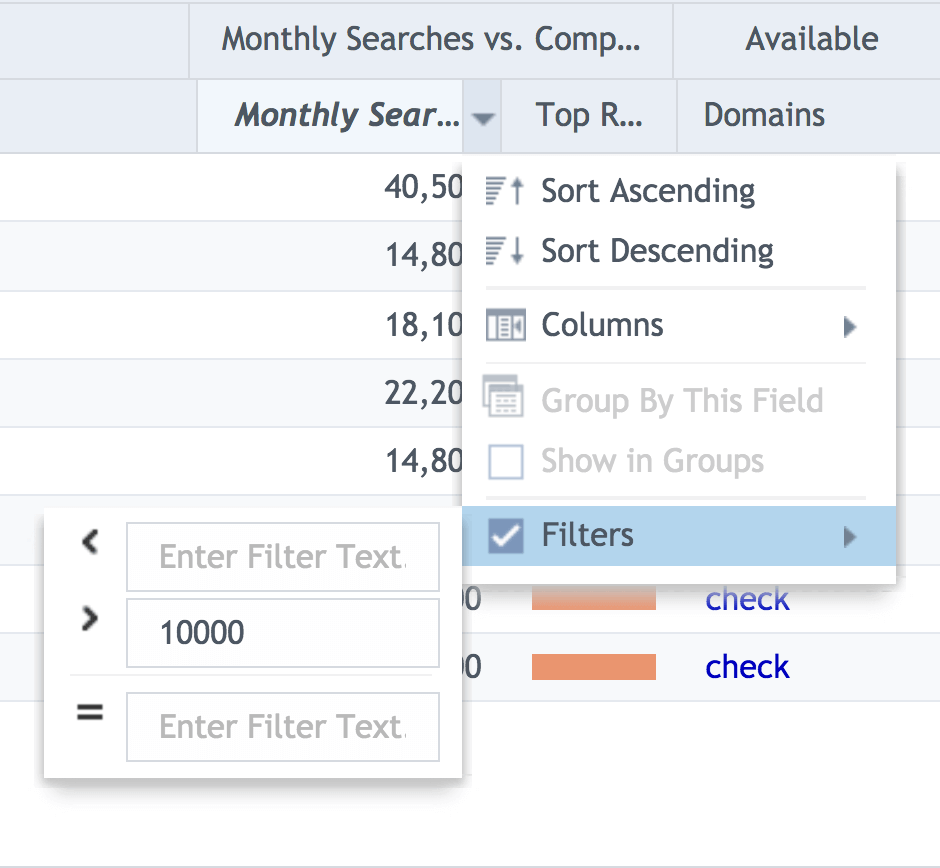

Brian's Bottom Line
Clunky? Yes. Intuitive? Heck no. Feature-rich? Absolutely. If you want lots of advanced features, and don’t mind a steep learning curve, definitely check out SECockpit.
Tap into Google’s massive keyword database.
The GKP is pretty vanilla compared to most other keyword research tools.
So why use it?
Because the data you get from it comes straight from Google.
(So you know its legit)
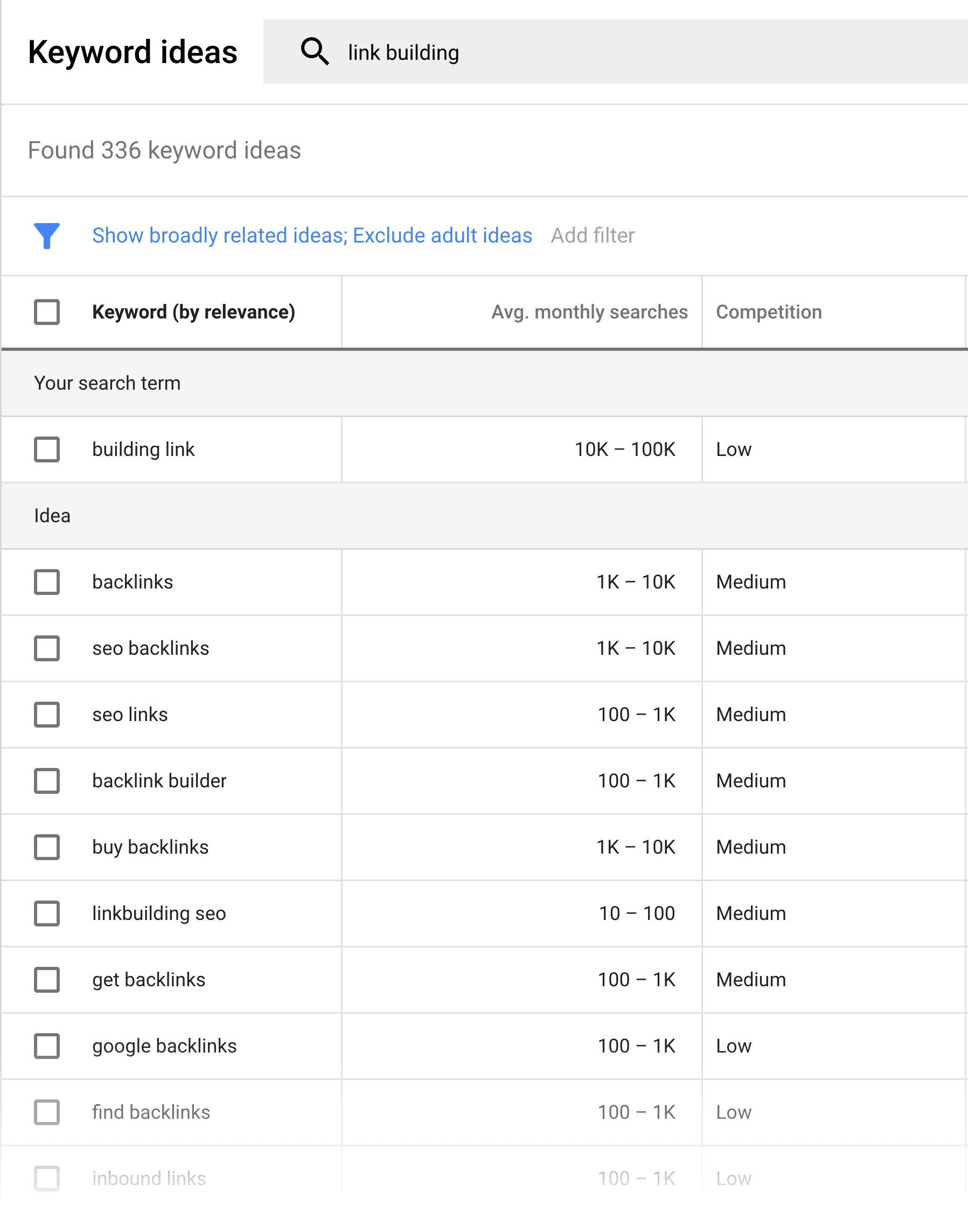
My Favorite Feature: “Top of page bid”
This is how much people advertisers are bidding on a keyword.
For example, of you see a top of page bid of $10, people are spending an average of 10 bucks per click.
Obviously, the higher this number, the more commercial intent that searcher has.
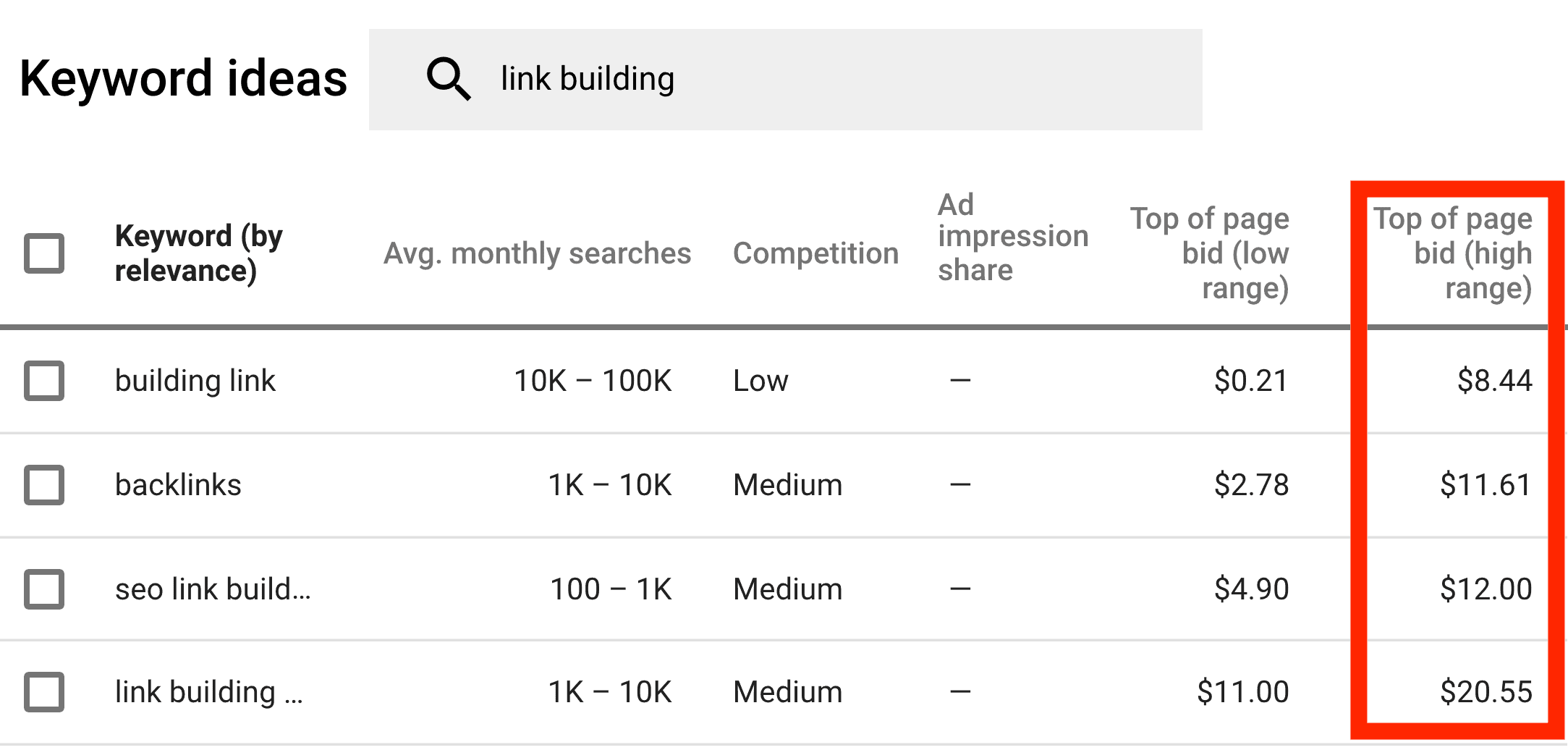

Brian's Bottom Line
The data in the GKP is the most reliable out there. That said, because it’s designed for Google Ads, using it for SEO can be tricky. This Google Keyword Planner Guide shows you how the GKP for SEO-focused keyword research.
10. KeywordTool.io
Get boatloads of targeted keyword ideas.
Here’s another Google Suggest scraper (just like UberSuggest and Soovle).
What makes KeywordTool unique?
Two things:
First, KeywordTool gives you A LOT of keyword suggestions.
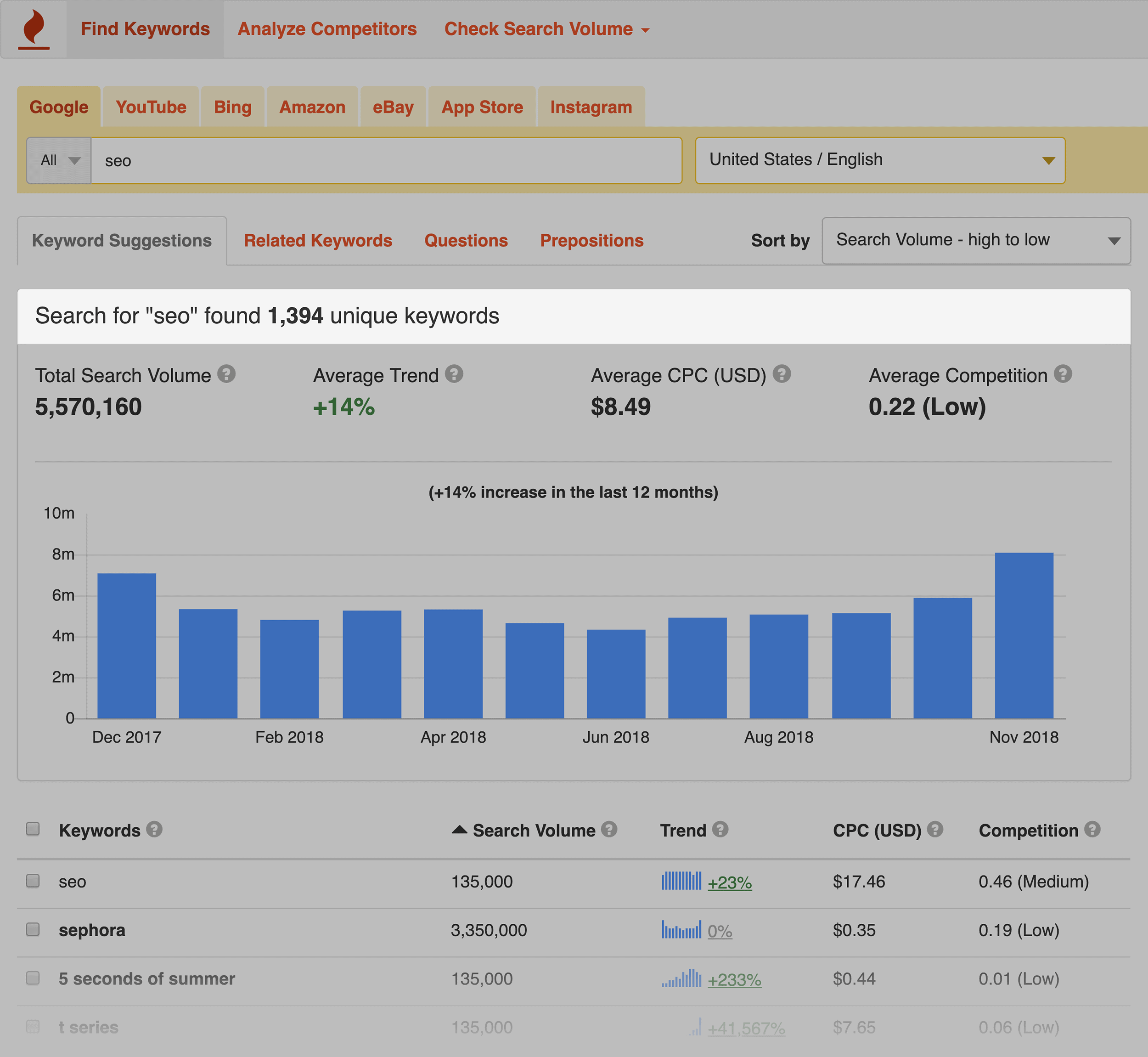
For example, I just did a search for “SEO”… and got 1,394 relevant keywords.
Not bad.
Second, you can easily filter, drill-down or expand the results to find the right keywords for you.
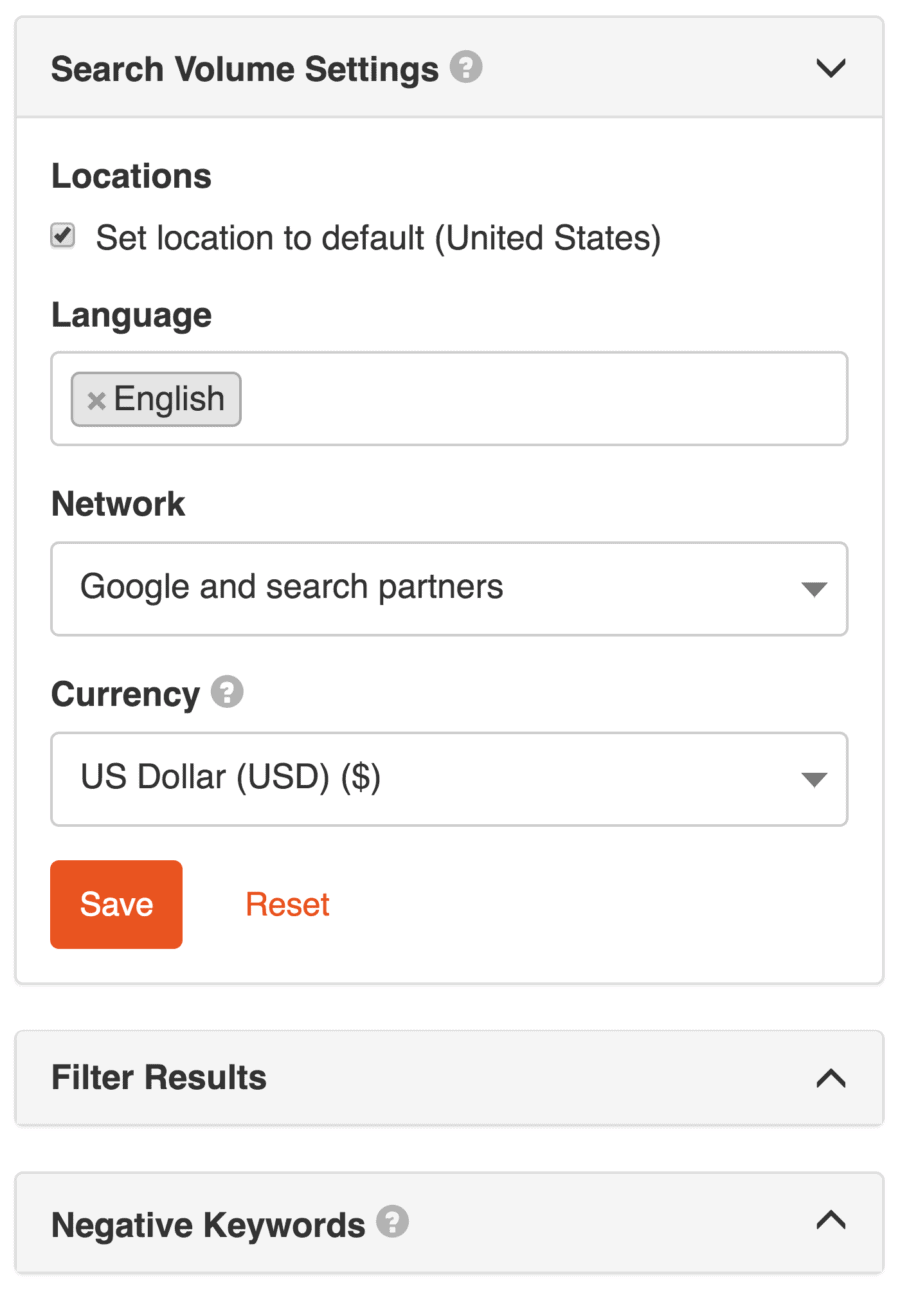
My Favorite Feature: Analyze Competitors
This is a very cool feature I don’t see in many other keyword research tools.
Just enter a competitor’s site… and the tool will generate a list of keyword ideas based on that site’s content.
For example, when I pop Backlinko into the tool, I get keywords that I’d expect.
(Like “SEO” and “blog”)
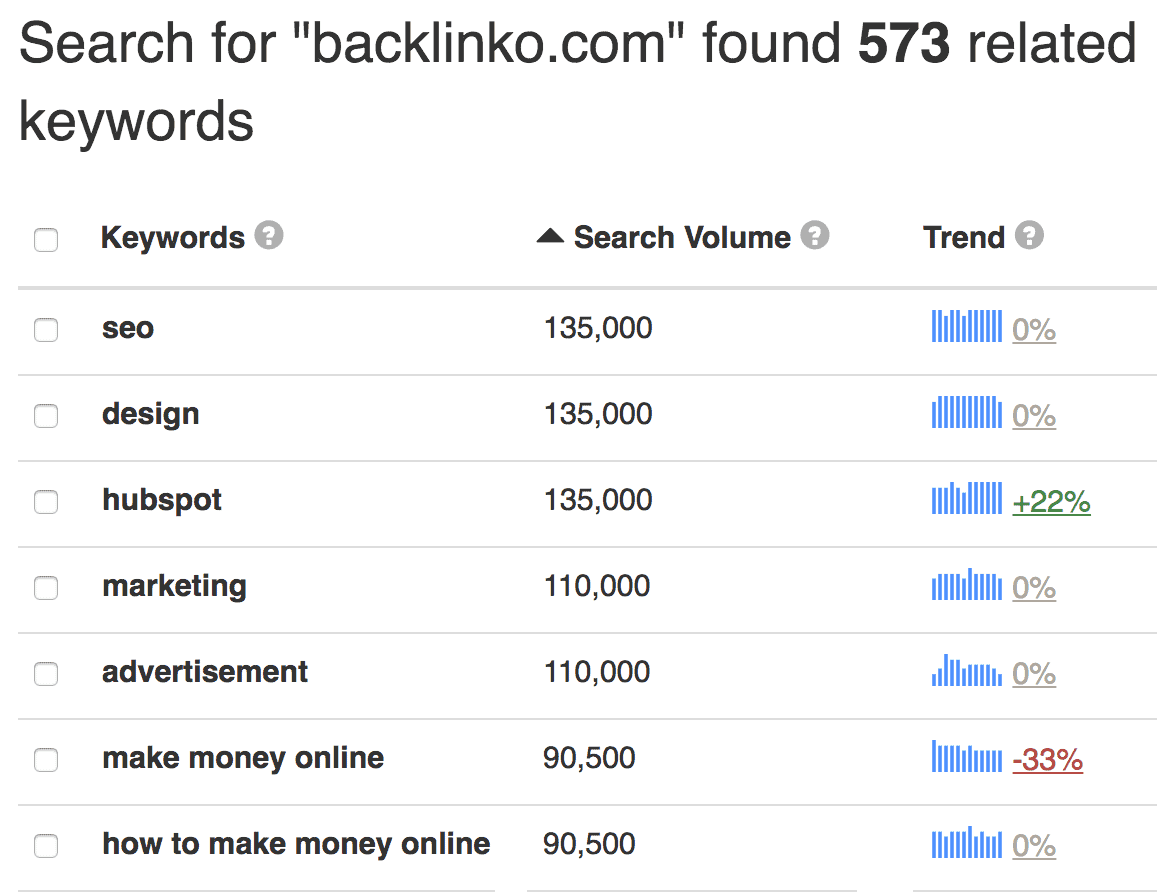
But I also came across terms that I don’t use anywhere on my site… but are closely related to the type of stuff that I write about.
(Like “digital marketing” and “how to check backlinks”)
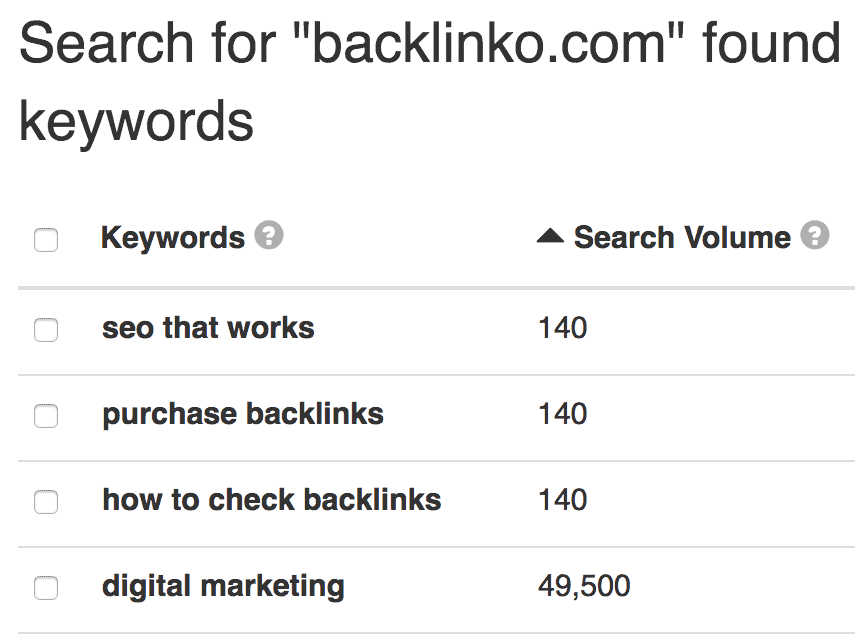

Brian's Bottom Line
One of the best overall keyword research tools on the market. Worth a try.
Find keywords that will generate the most traffic.
Moz’s Keyword Explorer does an awesome job of finding “lateral” keyword ideas.
For example, take a seed keyword like “weight loss”.
Like most other tools, you get a list of closely related keywords:
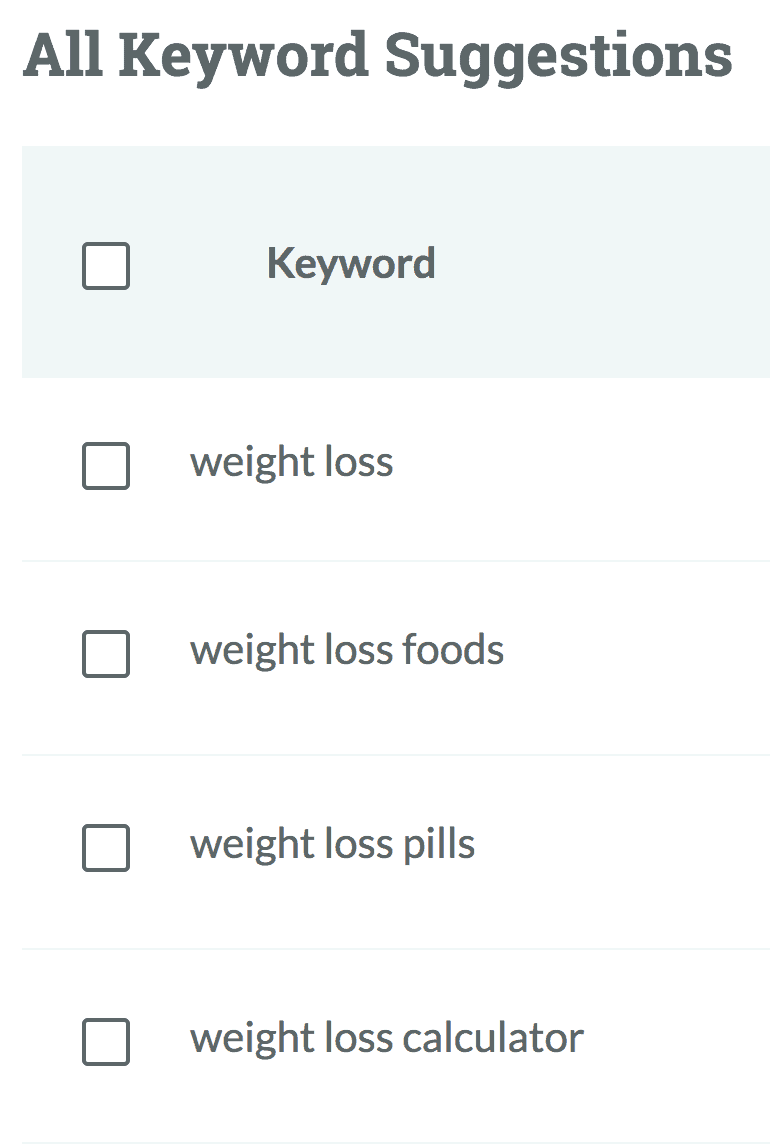
But what makes Moz unique is that it’s SMART.
This means you get outside-the-box suggestions that you probably won’t find anywhere else.
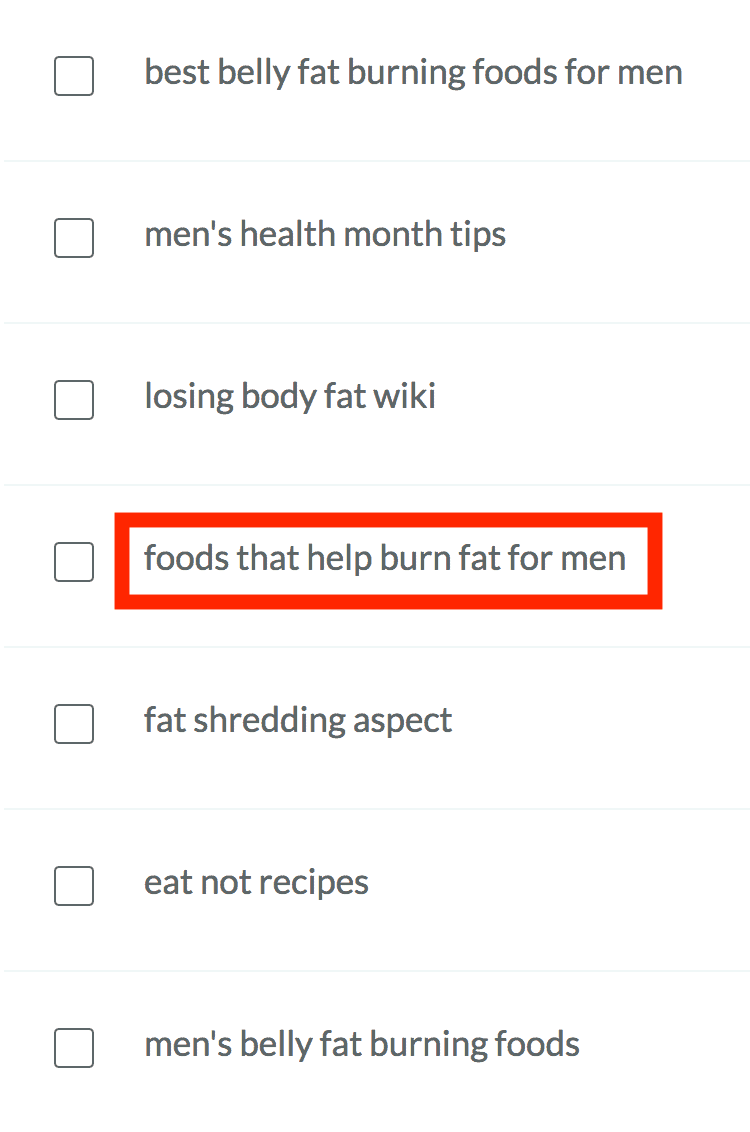
My Favorite Feature: “Organic CTR” and “Priority”
These two awesome features let you know how many clicks you can expect to get from your target keyword.
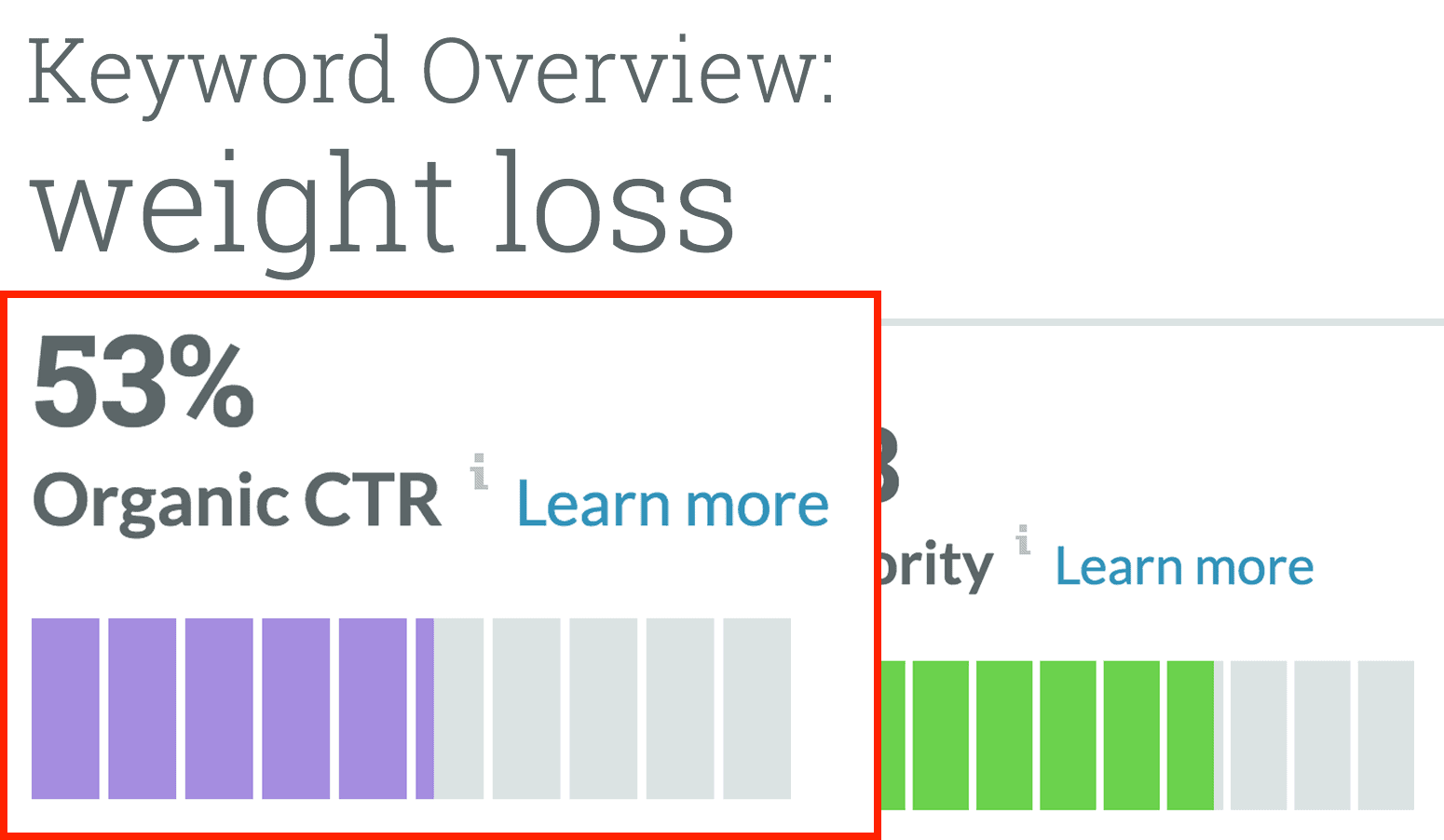
Organic CTR is the number of clicks you can expect to get if you crack the top 10. For example, if a SERP has a ton of PPC ads, news results, and a knowledge graph, your CTR is gonna be low.
Priority takesCTR, search volume and difficulty into account. It’s an “overall” score of whether or not you should target a particular keyword.
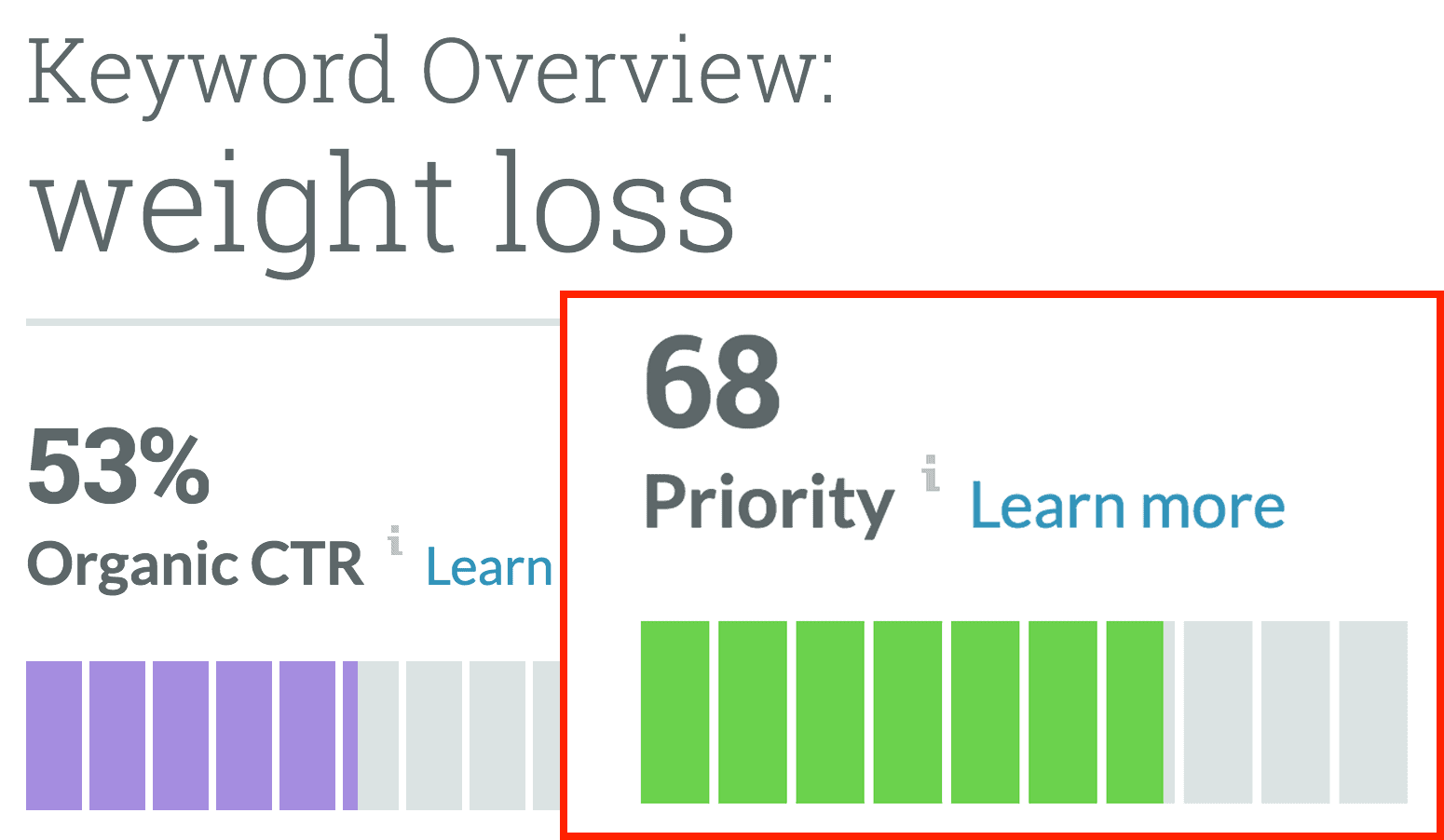
So if you’re overwhelmed by keyword data, you can use this single metric to find keywords that are going to bring you the most traffic from Google.

Brian's Bottom Line
Moz’s keyword tool is pretty darn awesome. Unfortunately, it’s not a standalone tool (you have to pay for their entire suite of SEO tools to use it).
Get search volume (and more) wherever you go.
Keywords Everywhere is a paid keyword research tool that displays keyword data on top of 10 websites …including Ebay, Amazon and Answer The Public.
That way, you don’t need to copy and paste keywords into the Google Keyword Planner. The data shows up in your Chrome browser. Very cool.

My Favorite Feature: “People Also Search For”
Get a list of keywords related to your search term… in the Google search results.
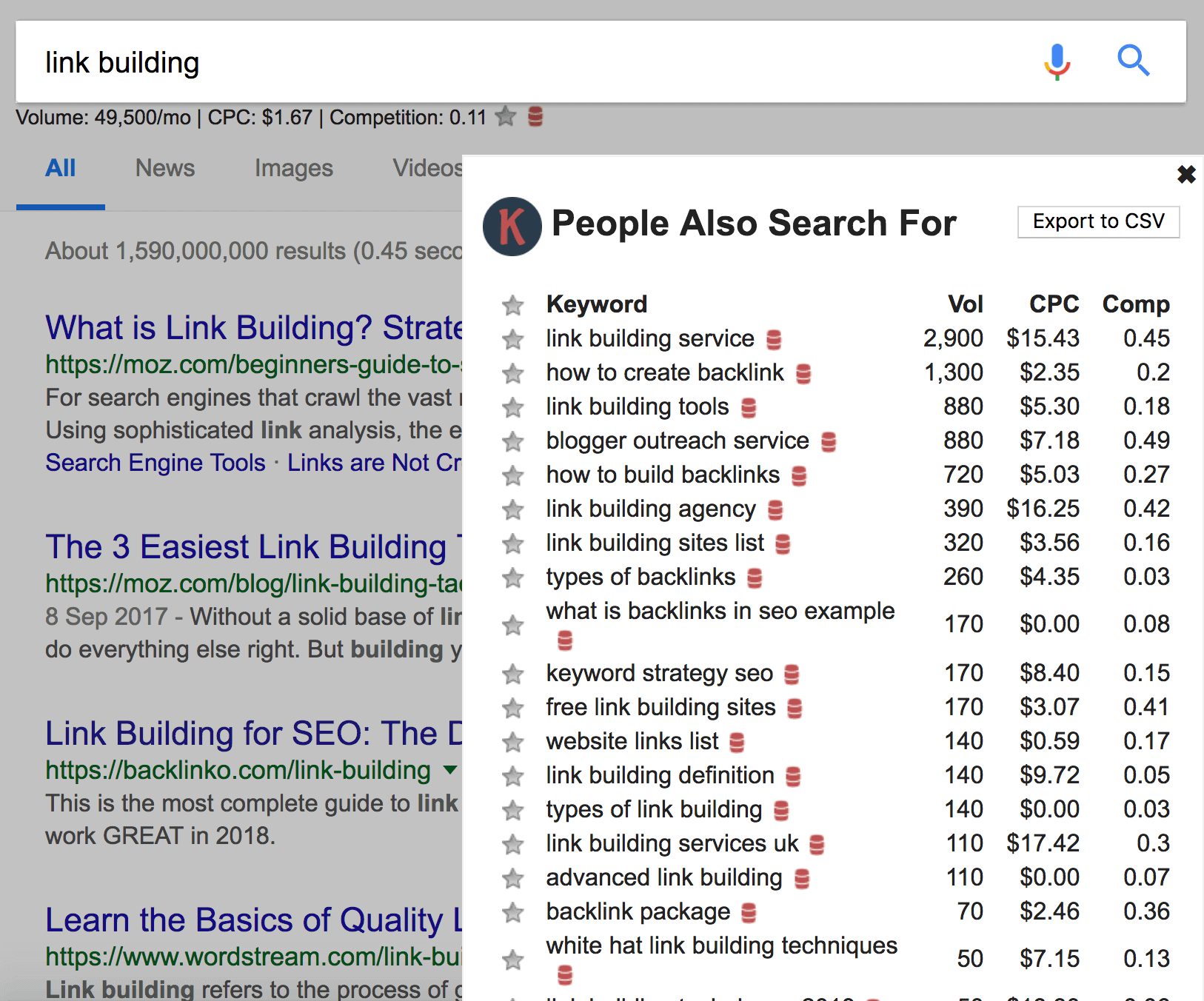
What’s cool about this feature is that you can find keywords that your target customer searches for when they’re not searching for what you sell.
For example, when I search for “SEO Tools”, I see terms like “Google Keyword Planner SEO” and “”Free SEO analysis”.
(Both of which get decent amounts of searches every month)
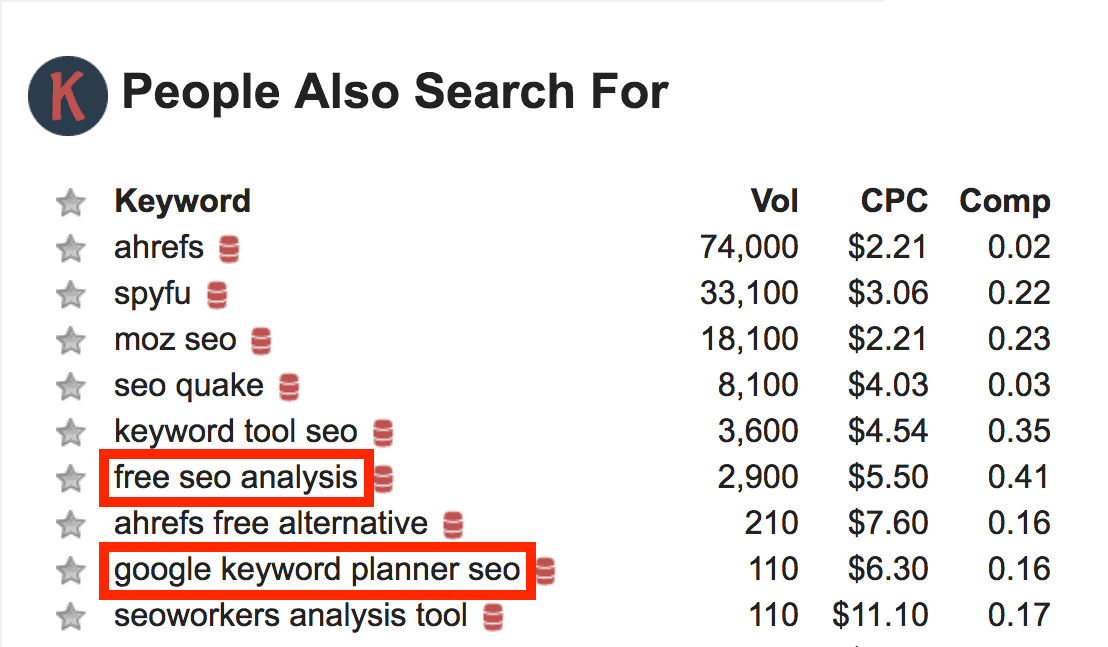
Nice.

Brian's Bottom Line
If you’re serious about keyword research you NEED to install this extension. It rocks.
13. Keyword Snatcher
Find 2,000 keyword ideas with a single search.
If you want a lot – and I mean a lot – of keyword ideas, Keyword Snatcher is a dream come true.
In fact, you’ll usually generate at least 2,000 keywords from a single seed keyword.
Here’s how it works:
Just open up the tool and choose the sources that you want Keyword Snatcher to pull its suggestions from:

I recommend keeping them all checked so you can generate as many keyword ideas as possible.
Next, enter a seed keyword into the field and click “Get Suggestions”:

And after a long wait, you’ll get an insane amount of suggestions:
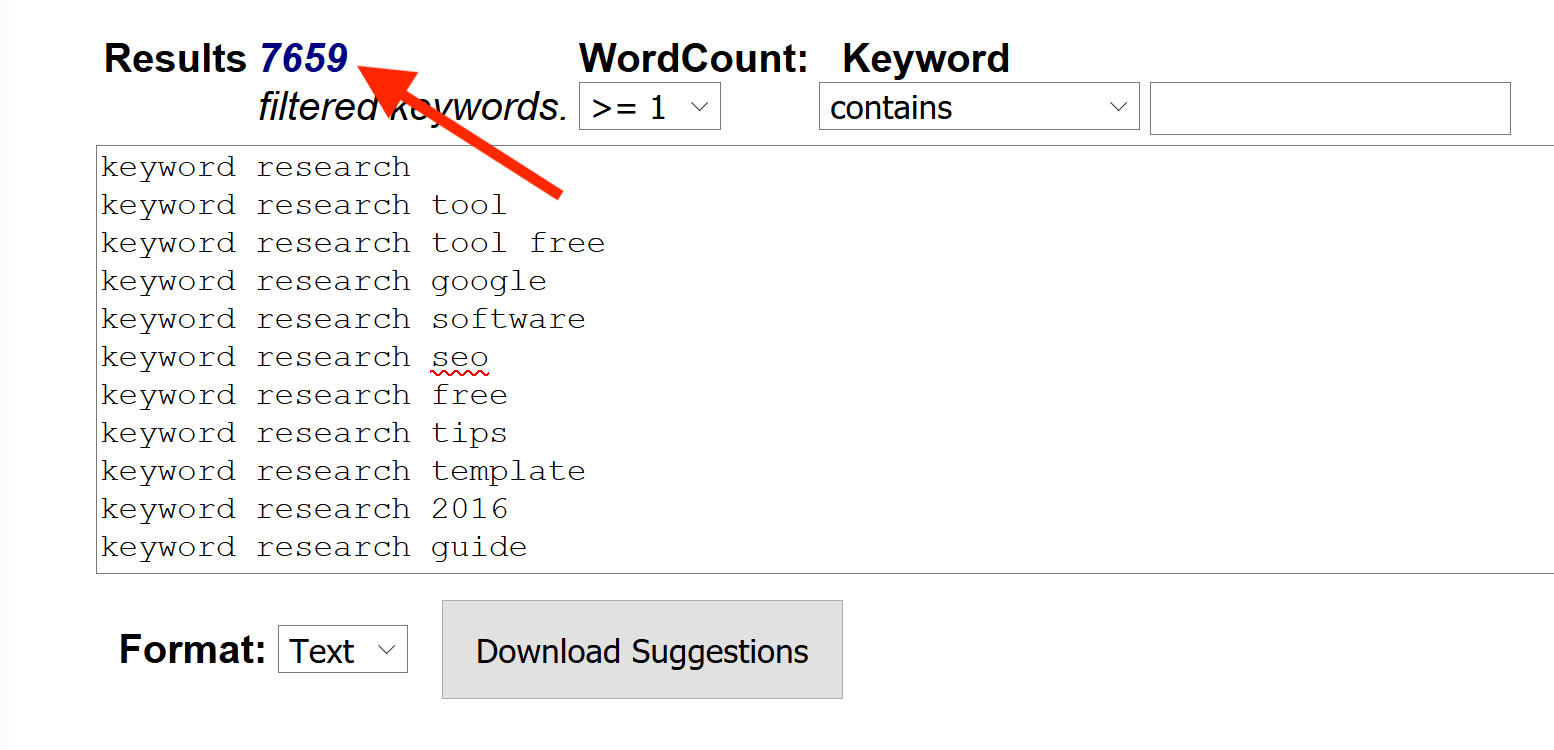
The big downside of this tool is that it doesn’t give you any data on the keywords that it generates (like search volume and keyword competition). It’s simply a keyword idea tool.
To get that information, you need to extract the list of keywords by clicking on “Download Suggestions” and saving your keyword list as a text or CSV file:
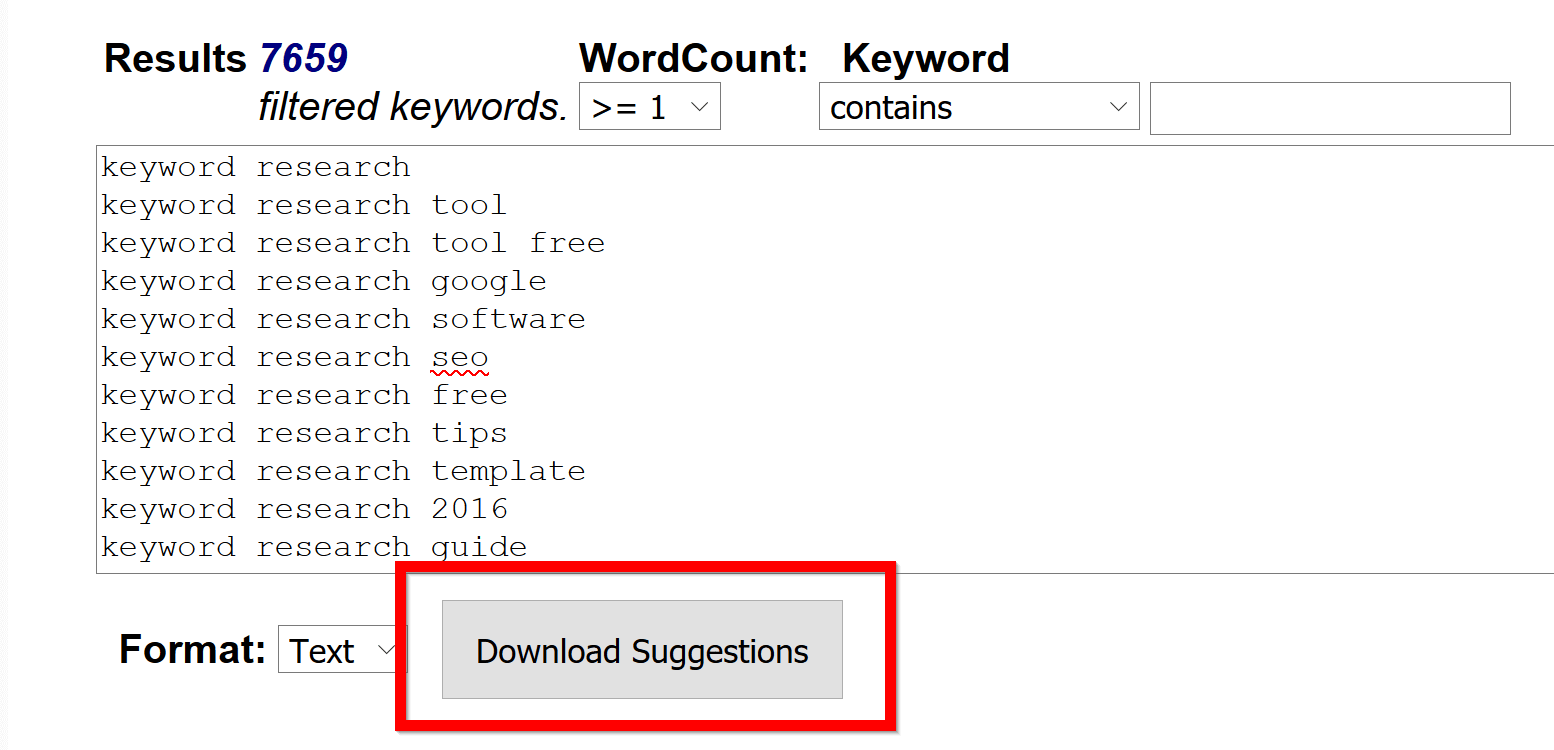
Then, copy and paste those keywords into the Google Keyword Planner.

My Favorite Feature: Word Count
This nifty sorting feature lets you focus on keywords that are a certain length.
(Like terms that are at least 4-words long)
This makes finding long tail keywords MUCH easier.
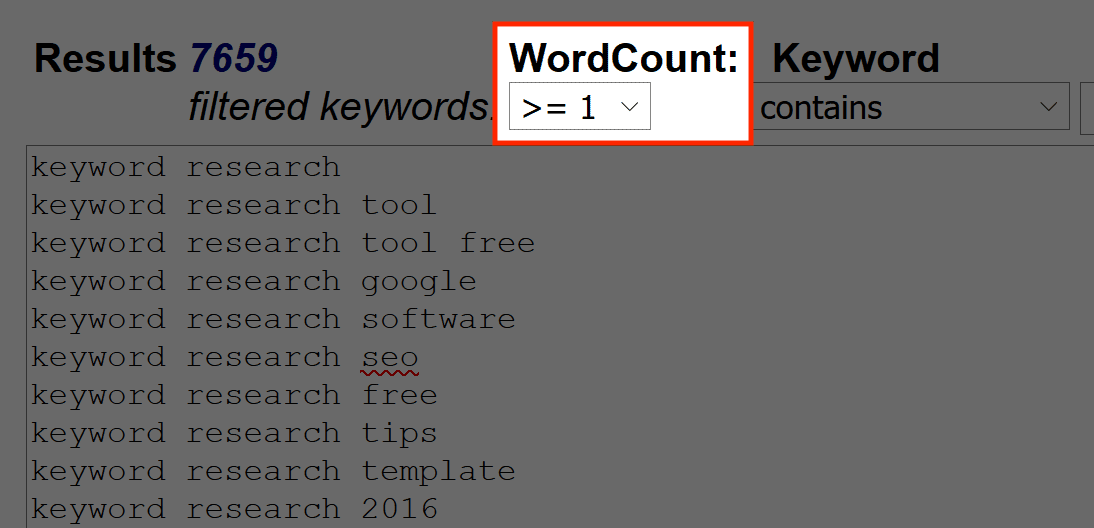

Brian's Bottom Line
Not the best keyword tool ever made. But it’s one of the few out there that don’t require a monthly subscription.
14. Google Trends
Find new keywords and search trends.
There are two ways to use Google Trends for keyword research:
First, you can search for a specific keyword…

…and take a look at the “related queries” section.
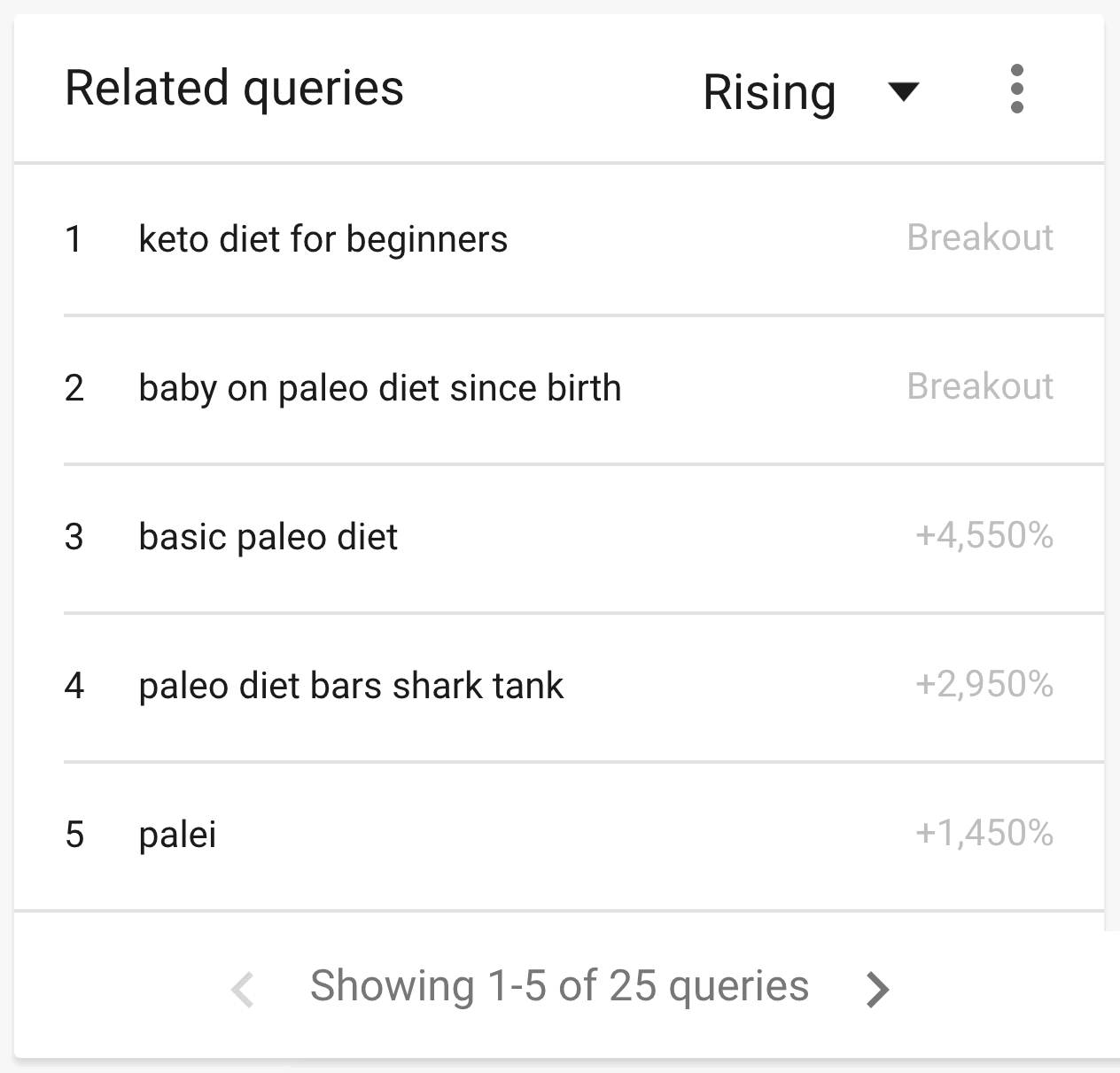
Second, you can see if whether or not a keyword is growing in popularity.
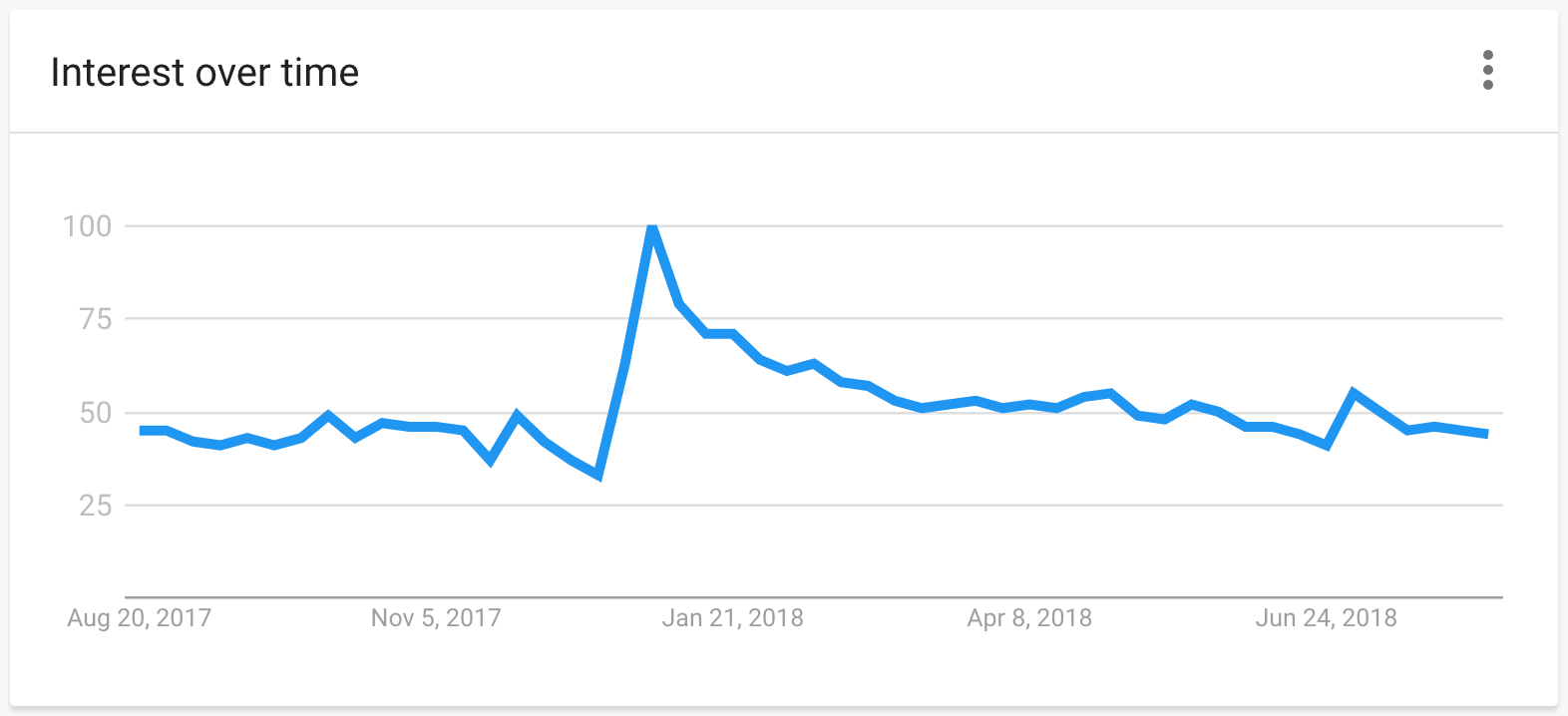
Why is this important?
Well, let’s say you’re debating between two keywords:
“Content Marketing” and “Inbound Marketing”.
As you can see, interest for “Content Marketing” is growing fast… and fewer people are searching for “Inbound Marketing” than ever before.
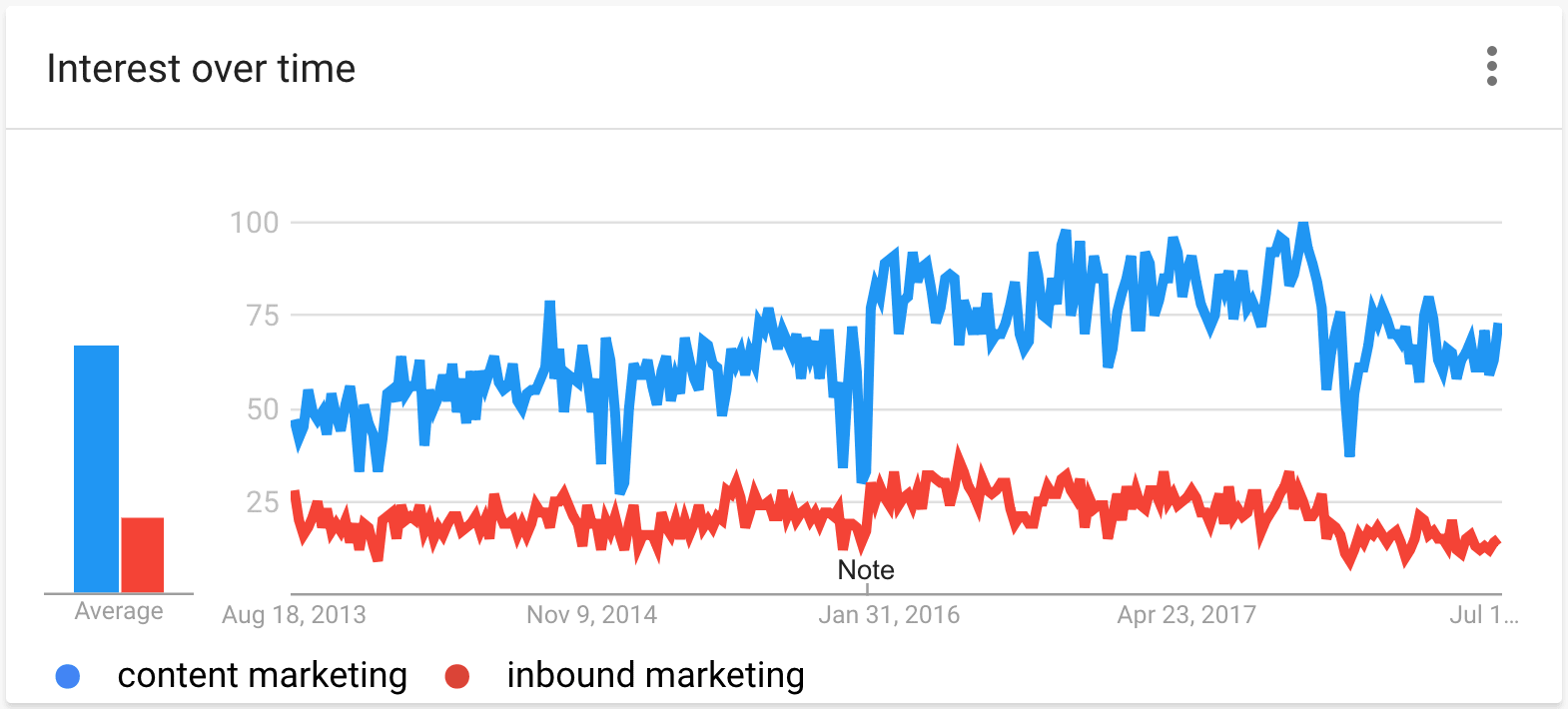
This isn’t to say that “Inbound Marketing” is a bad keyword. But the fact that it’s trending down is one factor to keep in mind as you decide on your next keyword.
My Favorite Feature: YouTube Search
See whether a given keyword is growing on the world’s 2nd most popular search engine: YouTube.
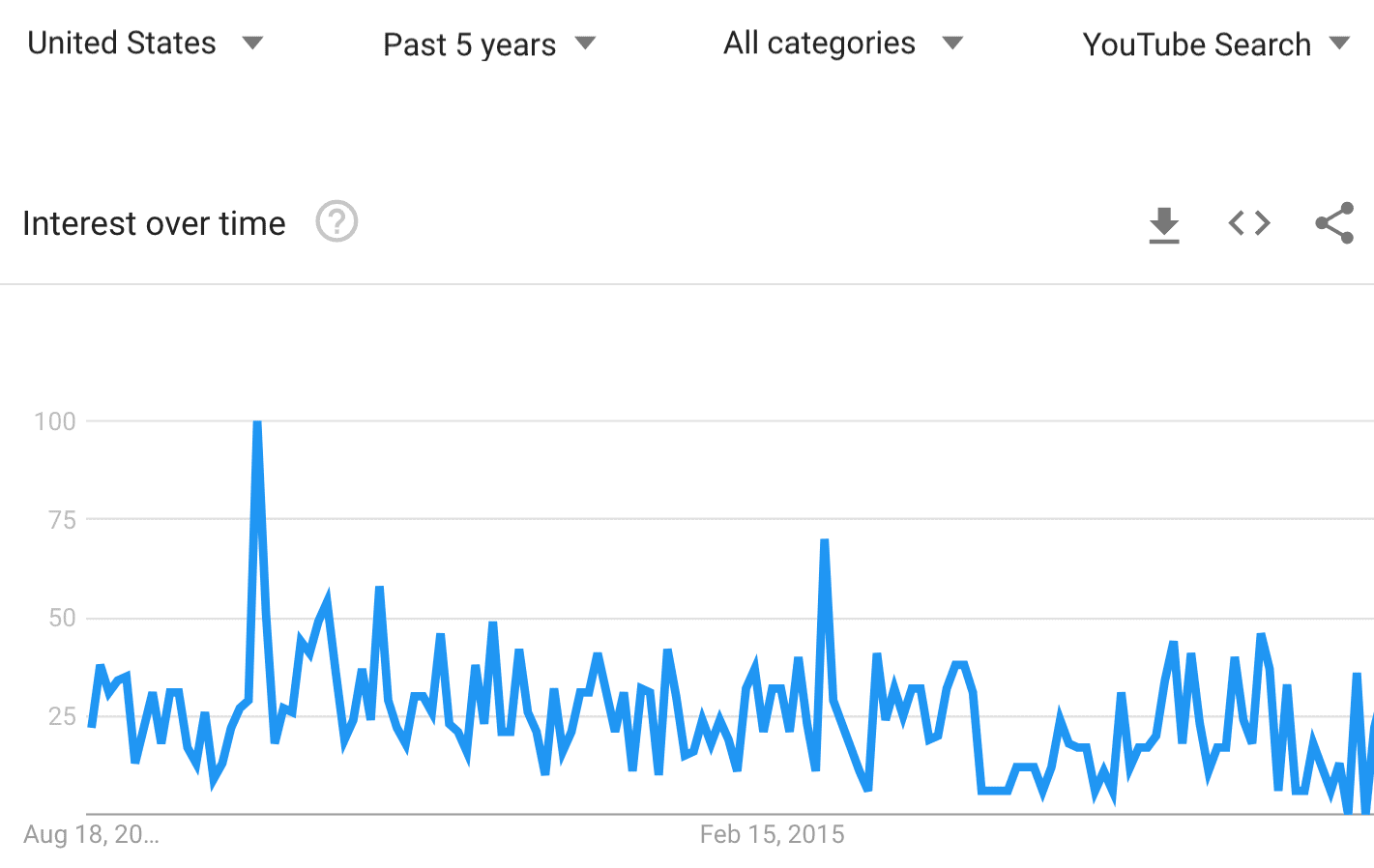

Brian's Bottom Line
If you write lots of evergreen content, you NEED to use Google Trends. That way, you can see if a keyword is going to bring you traffic over the long haul… before you write a word of content.
15. KWFinder
A powerful keyword tool that’s also easy to use.
KWFinder is quickly becoming one of my go-to keyword research tools.
Why?
Because it has lots of the features that other tools have. But unlike most other tool, KWFinder is VERY intuitive.
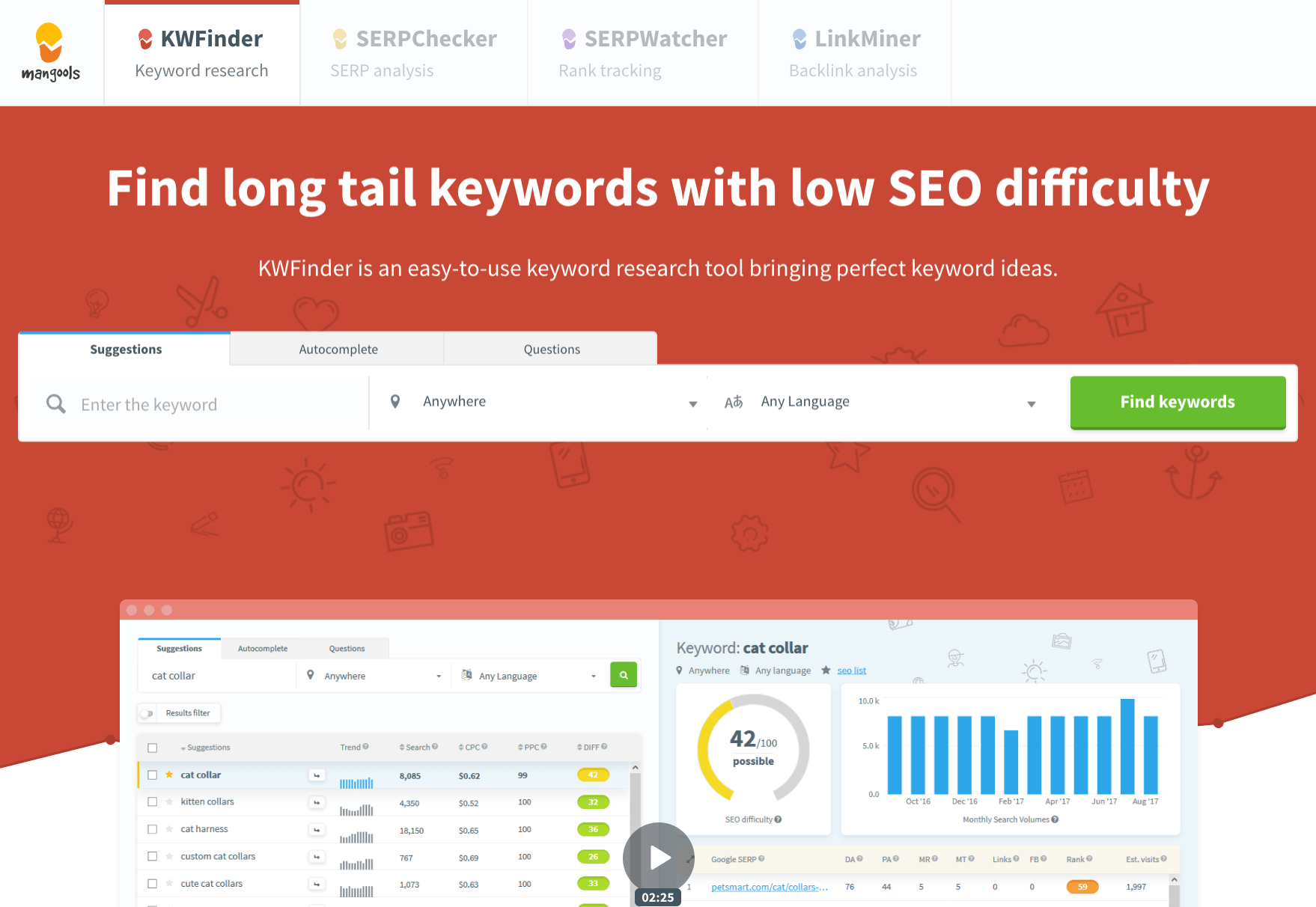
My Favorite Feature: Keyword Difficulty
As you might expect, this tells you how hard it will be to rank for that keyword.
But unlike most other tools, KWFinder automatically shows a Keyword Difficulty score next to every keyword.
(So there’s no need to click on every single one to see its difficulty score… which gets old fast)
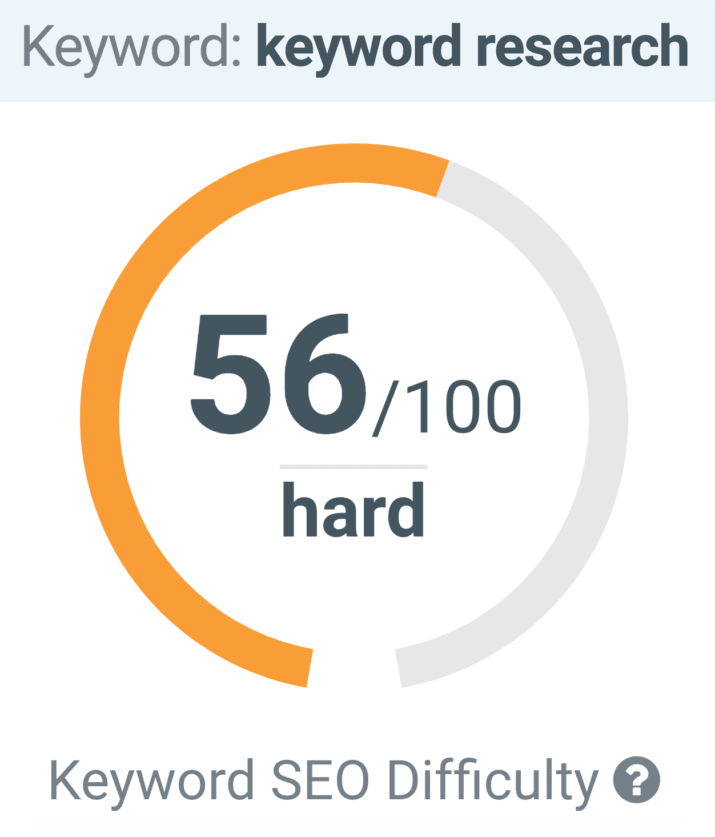

Brian's Bottom Line
At $29/month you really can’t go wrong with a KWFinder subscription. Great value.
16. QuestionDB
Find lots of question-focused keyword ideas (for free).
QuestionDB pulls question-focused keywords from threads on Reddit.
So if you’re looking for an alternative to Answer The Public, QuestionDB does the job.
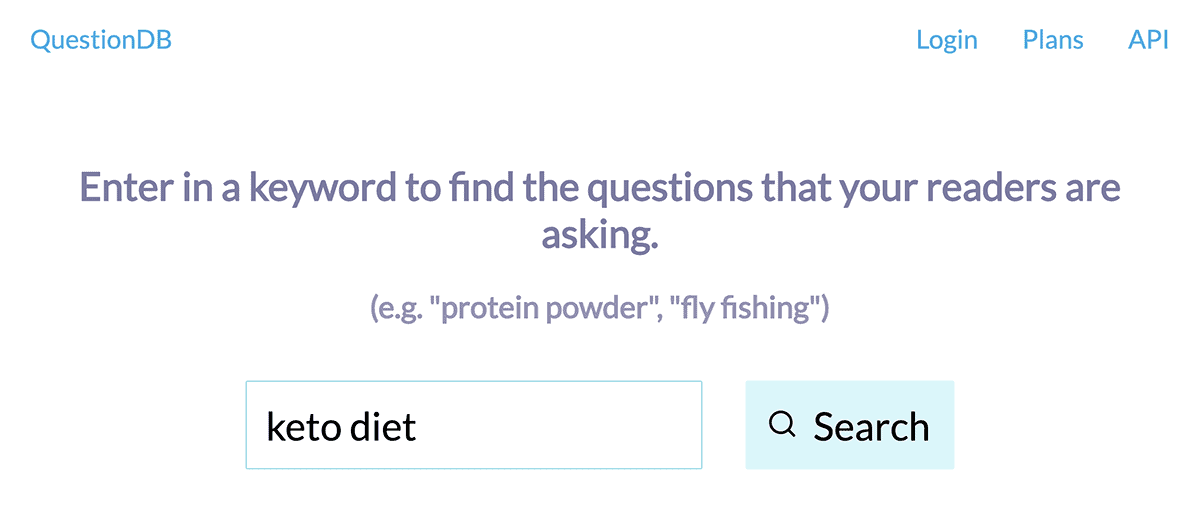
My Favorite Feature: Popularity
Sort the results by popularity. That way, you can create content that answers these burning questions.
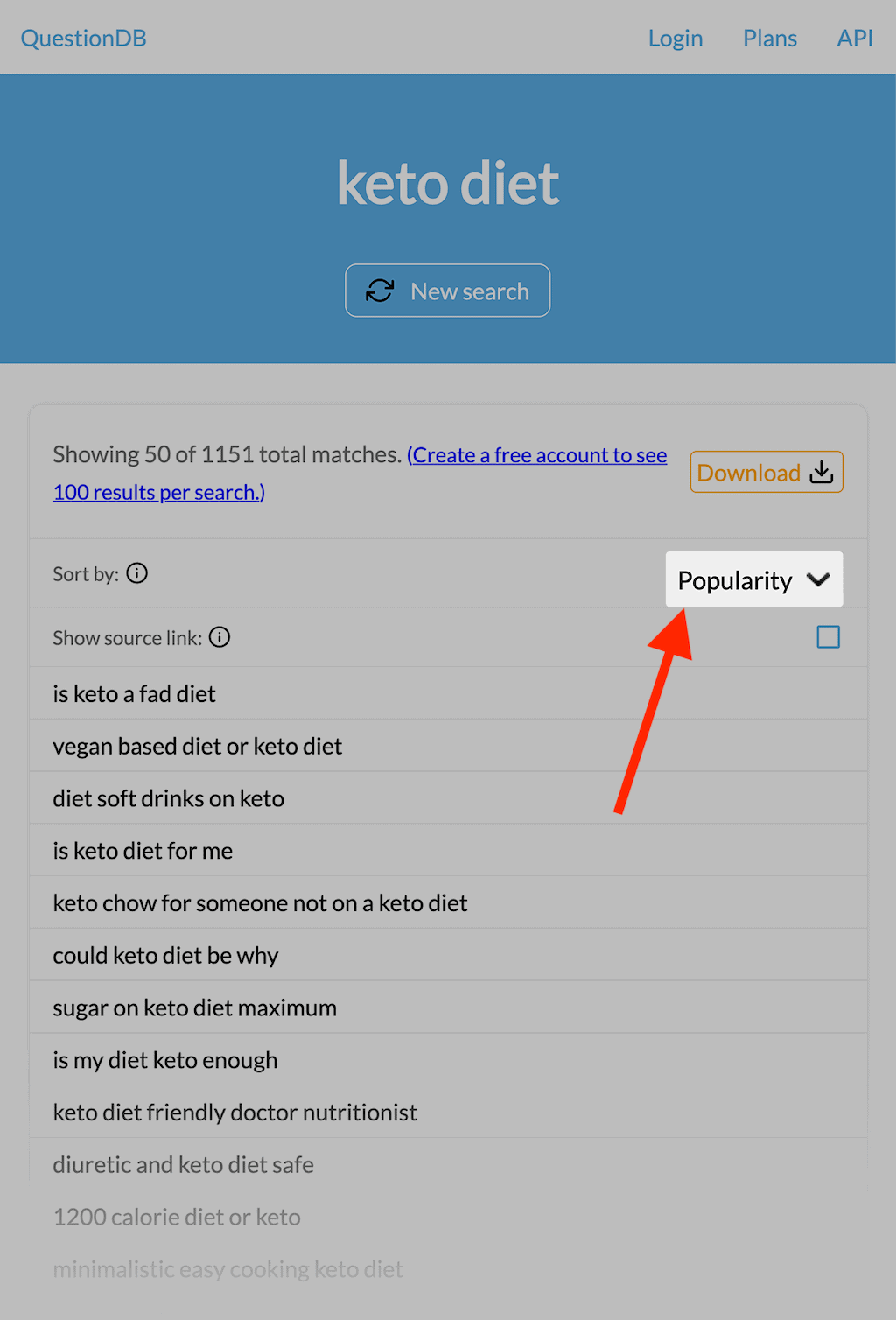

Brian's Bottom Line
When it comes to finding question-keywords for blog content, QuestionDB can’t be beat.
17. Serpstat
Analyze the first page competition.
Serpstat is a SEO software suite with tools for content, link building, and more.
Which means Serpstat doesn’t specialize in keyword research.
Even so, it still has a VERY decent keyword research tool.

My Favorite Feature: Competitors Graph
This lets you visualize the sites that are competing for a given keyword (and related terms).
So if you see big bubbles for “Wikipedia” or “Amazon” it’s probably time to look for a different keyword.
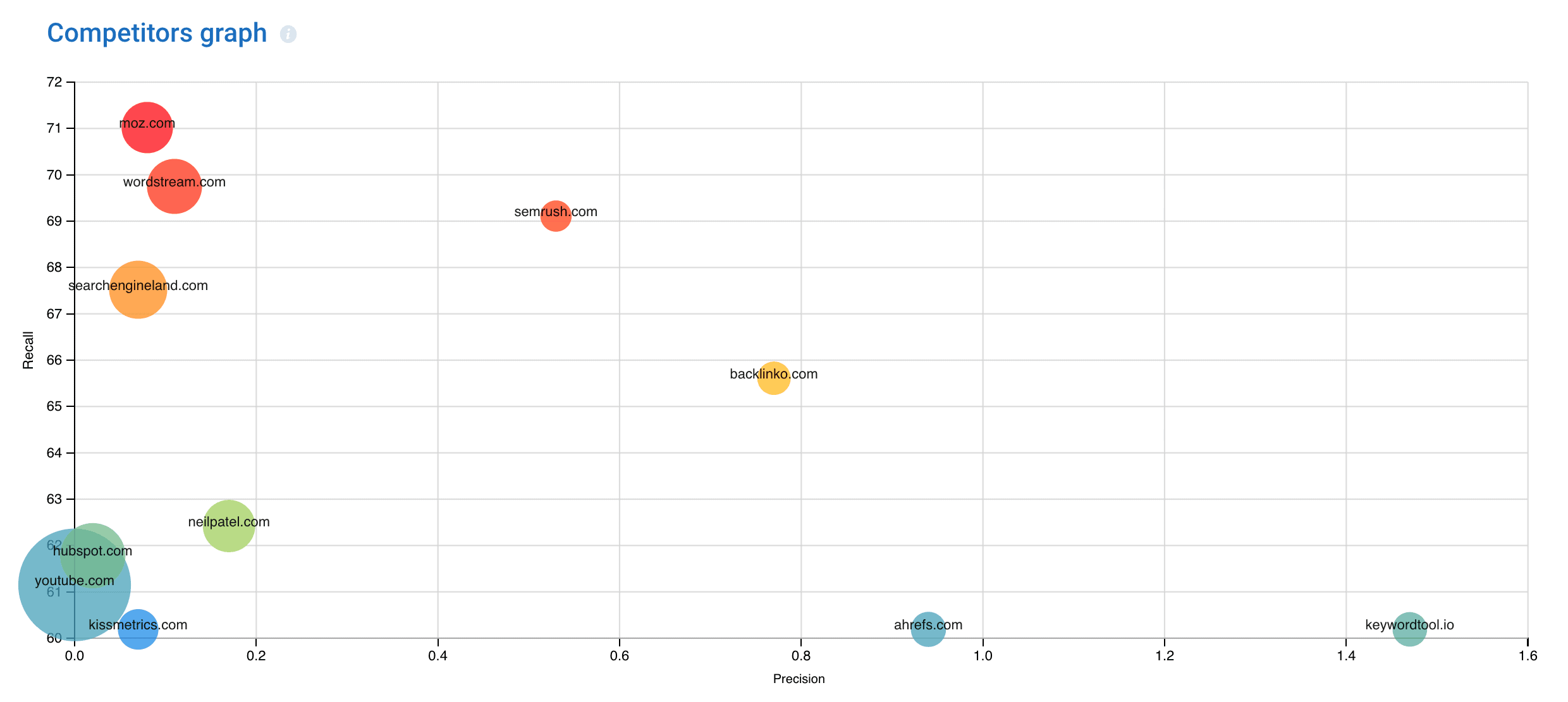

Brian's Bottom Line
Is Serpstat one of best tools on the market? No. But at $19 a month, you get a lot of pro features for your money.
18. AlsoAsked
AlsoAsked a fantastic tool for topic cluster research.
Seasoned SEOs understand that the best way to rank for head keywords is to create topic clusters — multiple pages that talk about the topic in-depth.
AlsoAsked helps you map out these clusters and visualize how people ask questions on the topic.
For example, let’s say you wanted to rank for ‘home security cameras’ – a head keyword that has a 100,000 monthly search volume.
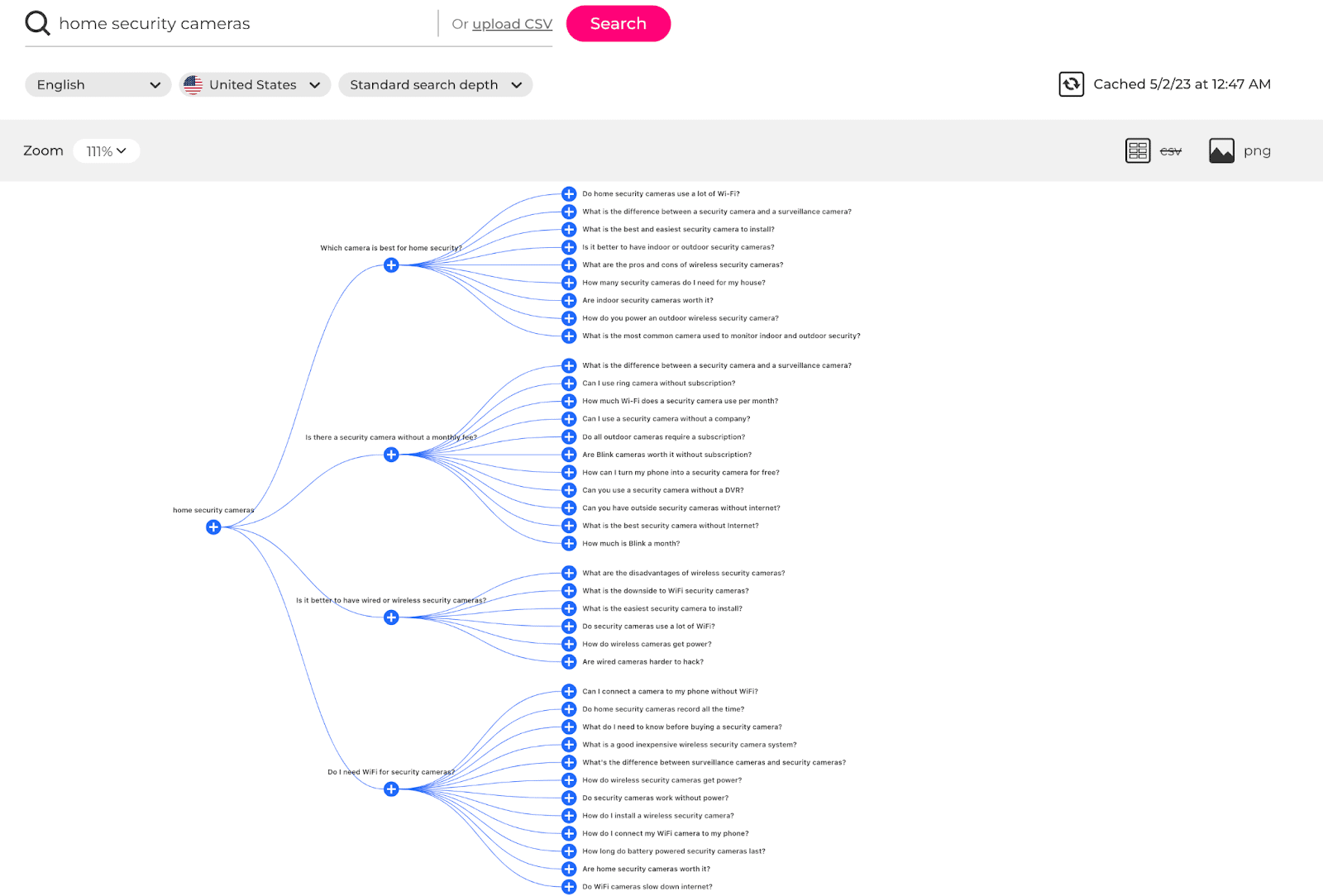
Plugging this keyword into AlsoAsked gives us four distinct cluster topics, divided into specific questions around each cluster.
Answering these questions in your content is an excellent method of building authoritative topic clusters — and driving tons of SEO traffic.

Brian's Bottom Line
With API access coming soon on Alsoasked, and with an affordable pricing, it could be a tool for SEO veterans to use while undertaking massive SERP analysis across different niches and regions.
19. KeywordTool
Great app for bulk keyword research.
Rounding up our list is Keyword Tool. It’s a great app for bulk keyword research, although the free plan is somewhat limited.
Plugging a generic keyword into the tool gives you a massive list of keyword suggestions, sorted by search volume, trend, and competition.
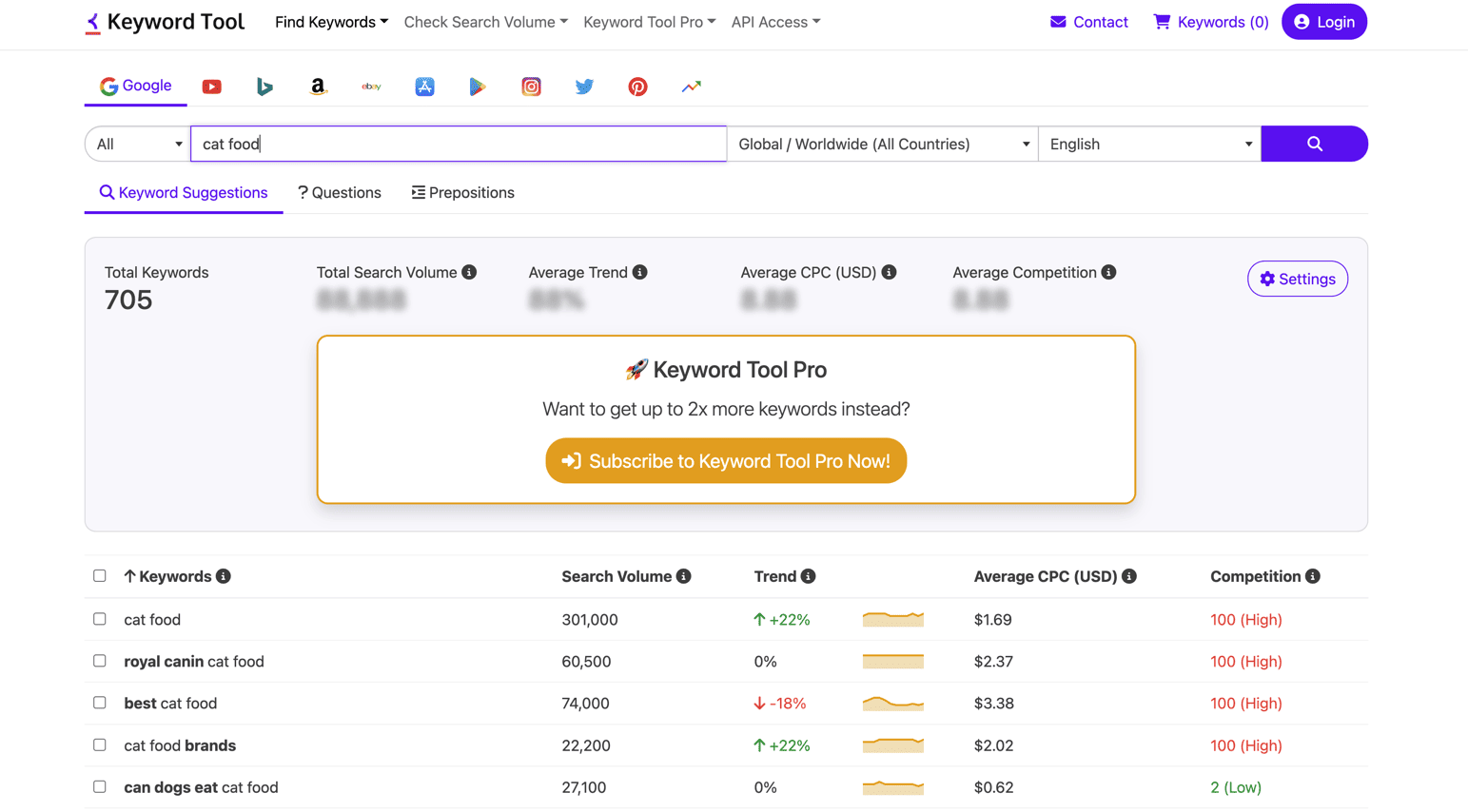

Brian's Bottom Line
Generate lots of relevant keywords by using this tool. However, the tool needs complimentary insights to get the most out of its output. Plus, it integrates data from other search engines besides Google thus opens more ranking opportunities.
